Kristen Lamb's Blog, page 13
January 14, 2020
Don’t Advertise, PADvertise: Catch Readers With Their Pants Down
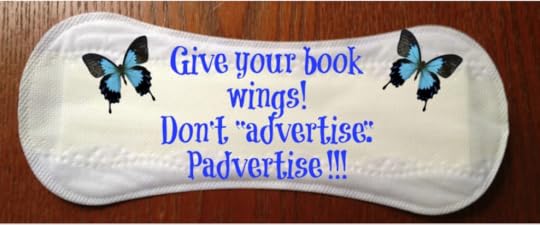 Book spam is so yesterday.
Book spam is so yesterday.Seems writers are always looking for some new way to advertise their books, which is fine…but some folks have gone more than a little bit cray-cray. I finally fled Twitter, by and large, because it’s next to impossible to locate real hoo-mans among all the automation. My email has pretty much gone feral as well, but meh.
Today, let’s have some fun at the bots’ expense, shall we?
Okay, any of you who regularly follow my blog know that I am totally out of my mind a bit eccentric. I’m reposting this blog because a) I’ve been flattened with bronchial pneumonia b) I have to travel and c) this post never stops being funny…especially if you’re like me and have the same sense of humor as a fourteen-year-old boy.
This post was inspired when I was speaking in Idaho. I’d excused myself to the ladies’ room and, as I closed the door to the stall, I noticed all the advertising on the back of the bathroom door. This cluttered wall of ads made me think about all the authors spamming non-stop about their books on social media and via email.
Writers were becoming worse than an MLM rep crossed with a Jehovah’s Witness. Could the author book promotion get any more invasive?
Wait…
Maybe it could.
I’ve blogged so many times about the dangers of automation and how spamming people is counterproductive. I’ve talked until I am blue about how the non-stop blitz of advertising our books has a terrible ROI (return on investment) and how most people don’t pay attention to it.
Ah, but then it hit me.
The main reason advertising doesn’t work is because people ignore it and no longer see it, but what would they see?
Go big or go home, people.
Panty Prose—Not Advertising, Padvertising (TM)
We all know that roughly 85% of readers are women, and what do women need? Panty liners. YES, but what do they need more than springtime fresh girl parts? More FREE! books. Indie authors shouldn’t spam about their latest book release or be advertising their free title on KDP select.
Why?
Because when we advertise at the expense of authenticity it’s a dirtbag move? No! Because it’s self-serving and obnoxious? Not quite. Because it smacks of desperation? Not at all. The reason authors shouldn’t spam about their books is because spam is for amateurs.
The business savvy author of the digital age doesn’t settle on blasting out non-stop self-promotional tweets to advertise. That is SO 2014. The REAL writer of the digital age realizes a captive audience is a a buying audience.
This is 2020 people.
Catch readers with their pants down with Panty Prose.
Panty Prose is perfect for the indie author. Most readers are female and even females need something to read in the bathroom. We at Panty Prose (a new imaginary division of W.A.N.A. International) have teamed up with Always against their will to offer your readers the best deals right in their pants.
Seriously…
Advertise smarter.
Panty Prose not only offers you PADvertising to a guaranteed clientele, but we have all kinds of layouts to suit your PADvertising needs. Technology is your friend with Panty Prose. Want to advertise?
Put your book where it counts…
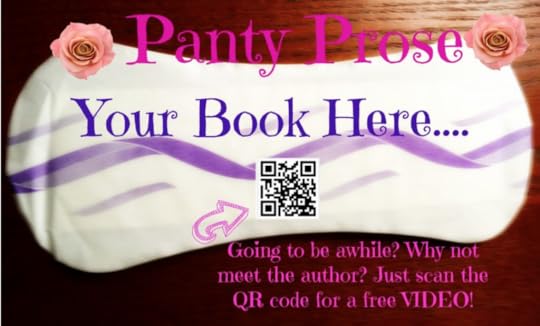 Sell like a pro!
Sell like a pro! At Panty Prose, we even make it affordable for you to place your face in your reader’s pants…
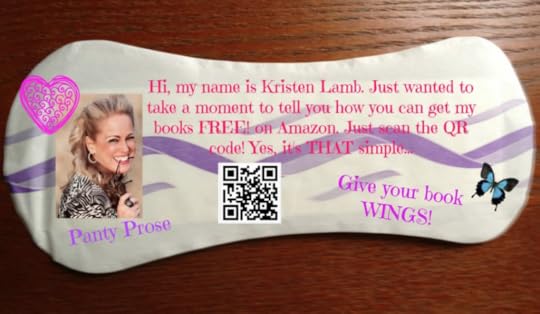 Affordable packages available SOON!
Affordable packages available SOON!As you can see, Panty Prose is inserting your ads into a virgin market begging to be tapped.
*blank stare*
Why are all the romance authors giggling? You’re being very distracting.
Anyway, while others might see a protective strip that gets tossed in the bin, we see an unused space to advertise—no to PADvertise—your latest novel AND save trees! Instead of throwing away that paper strip, we can print off lines from your book so fans can collect them ALL…
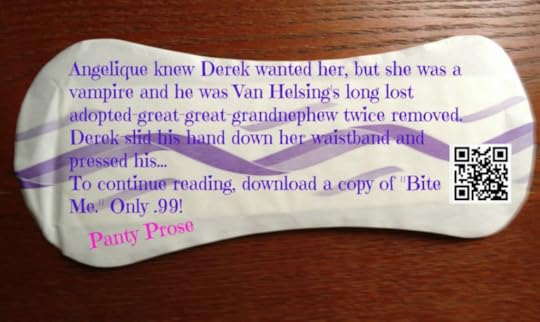 Make readers your fans for ALWAYS….
Make readers your fans for ALWAYS….Panty Prose is dedicated to keeping women fresh while selling your books. Attending a writing conference? Well, there is a bathroom and everyone knows that even agents can’t hold it forever.
Why not help them out? Keep them springtime fresh and give them your query. Elevator pitches are for losers, when you can use the Panty Pitch. The Panty Pitch comes in three fragrances, Sonnet’s Eve, New Office Supplies, and Cinnabon.
Advertise with the Panty Pitch:
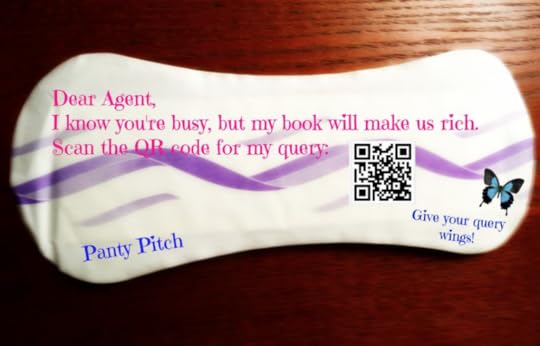
Panty Prose for the Published Professional is a smart, savvy way to advertise and stand out from all the competition that’s still relying on scheduled tweets and blasting out spammy emails. Make an impression that will last for Always.
Much like this post. I’d blame the meds but this is a reblog from years ago.
Advertising, Absurdism & Sometimes You Gotta Just LAUGH

In all fairness, I spent an entire day ‘Photoshopping’ my face onto panty liner strips to make a point—other than all my primary school teachers were correct when they checked, ‘Does Not Use Time Wisely’ on every report card EVER.
We’ve probably all done the dumb stuff because some ‘expert’ said it was a bright idea. I have. I almost named my first social media book, ‘I Did All the Dumb Crap So You Don’t Have To.’ But it was a bit long to try to fit on a cover.
The best way to sell books is to hunker down, and embrace the hurt locker that is our profession and write incredible stories readers will discover then fall in love with. Learning our craft is tough. It’s a long process, but once you start gaining skill and mastery, it’s worth it.
Sure, we can advertise, but that’s really not going to drive sales the way good old fashioned word of mouth will.
Go to this post, On Writing: Why Mastery Should Matter to the Serious Author. I have a LONG list of resources, colleagues I respect, mentors who helped grow me from a primordial ooze of purple prose into the comedic GENIUS unafraid to be on a panty liner to make a point 
January 10, 2020
No Sales or Lackluster Sales: It Isn’t the Reader, It’s the Book…Really
 Original image courtesy of Juhan Sonin via Flickr Creative commons.
Original image courtesy of Juhan Sonin via Flickr Creative commons.No sales or lackluster sales. It isn’t the reader’s fault. It’s the book. Really. This is tough to hear. I know.
It’s a writer’s worst nightmare. You researched, you wrote, you finished, and then published your book. You wait for the sales and….
*crickets*
This is something that can happen to any kind of author, traditionally or nontraditionally published.
We think we have a hit on our hands only to later be checking our work for a pulse. What happened? Why did everything go sideways? Where are the SALES?
Sales & The Market
 Remaindered titles.
Remaindered titles.In the not so distant past, there was only one way to get published and that was traditional publishing. Though many authors cheered when they were finally able to cast off the chains of New York, let’s at least respect that agents and editors might have known a thing or three about the book business and how to generate book sales.
Writers would often get vexed at the stack of rejection letters, believing they couldn’t actually write well.
This was not always the case. Sometimes the writing was perfectly fine, or even really good. Great even.
Alas, agents made their living off books they knew would sell, which meant they just didn’t have the bandwidth left over to take on pro bono work. Yes, the book might have been lovely, but they were agents, not charities. They couldn’t gamble on a well-written book in an untested genre or for an unvetted audience.
Agents had to find the book they knew publishers would BUY based on metrics of what had already sold well in the past.
Not a perfect way of doing business, but better than guessing and paying a blind oracle to throw chicken bones.
***This is largely still how things work, though publishing is in so much flux that agents are doing things differently these days because the paradigm has changed so drastically.
Sales kept the lights on.
Agents predicted market changes and trends. They looked at what was already out, what was slated to be released, what was already selling, what wasn’t, what was saturated, etc. Then, they used that data to maneuver their authors around the sales minefield.
Still do to the best of their abilities.
This is where it can get tricky for writers. Yes, write what you love. We shouldn’t write for the market…but we have to write for the market.
*bangs head on wall*
Sometimes a book might not be selling simply because there are too many titles that are too similar. Readers maybe don’t want yet another tired vampire retread.
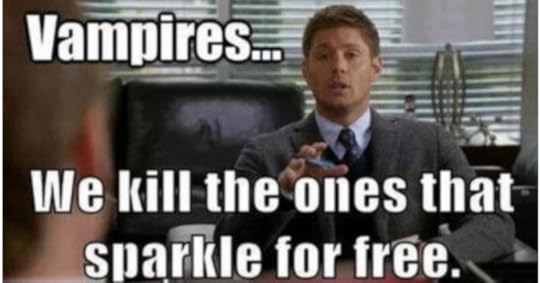
If you are traditionally published, this could still happen. Agents are making an educated guess and sometimes they miss the mark.
***As a caveat though. A hedge fund bought Barnes & Noble in June, Dean Koontz defected to the Amazon-powered Thomas Mercer in July, and Penguin just sold last month. So, legacy publishing is in a righteous hurt locker at the present. They don’t have the luxury of missing many sales marks any more.
For the self-published folks? If your book is good, just leave it alone and keep writing. The great part about the digital paradigm is the book can remain there indefinitely and when the trends change? So could the sales numbers.
Sales & The Product
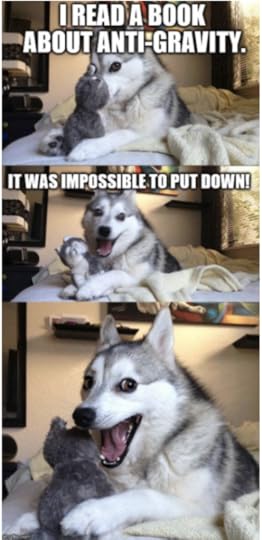
I hate saying this, but sometimes it’s the book. Obviously this is more the case with indie and self-published books. The problem is that the market has just been inundated with amateur writing. I go into this in more detail in Five Mistakes Killing Self-Published Writers, but here are the Spark Notes.
Bad Writing
No one wants to hear they are not ready. Worse still? No one wants to hear the words, ‘You’re just not a good writer.’ Too many newbies want to skip the un-fun training and go right to the title, ‘Author.‘
Sadly, the slush pile has been handed off to readers. I rarely do edits because I’ve grown weary of arguing with ‘writers’ who can’t even punctuate. Their books aren’t selling and they hire me to tell them why.
I explain WHY, then they send me long emails how I am mean and horrible because I won’t tell them it’s the reader’s fault for not seeing their hidden genius or that it’s a failure in the marketing plan.
I’m a bad person because I expect them to tell a STORY, not camp on self-indulgent tripe that only entertains THEM at the expense of the audience. So if expecting writers to know how to do the very BASIC of their job is mean?
I’ll own that.
If I want writers to actually reach for something other than reheated, microwaved tropes served so many times they’re no longer fit for human consumption?
Then yes, I am a vile and horrid person.
This is the ADULT TABLE. Those who want to play Literary Barbies and Literary G.I. Joe aren’t allowed a seat here until they grow up. And that doesn’t—in my book—make me ‘mean.’
It makes me a professional.
Moving on…
Bad (No) Editing
Our story might be the best thing since pumpkin spice lattes, but if it is so rife with errors it won’t sell? Shame, shame. Additionally, editing is not simply looking for typos. That is line-editing or proofreading.
A good developmental editor (or content editor) will be able to help you shape the overall flow of the novel. But they cost a lot (good ones do, anyway).
This is why it’s a good idea to read a lot and take classes and LEARN the craft. It will save a lot of time and cash in the long run.
When I edit, I can tell writers if they are starting the book in the correct place. Are there scenes that need to be cut because they are bogging down the momentum? Are there redundant characters? Am I spotting any plot holes? Is the ending a knockout? A fizzle? Or a WTH?
Great editing can take a book from meh to magnificent.
Bad Cover
There really is no excuse for a bad cover these days. Technology has come a long way, and many experts offer fabulous covers at affordable prices. I would love to say people don’t judge a book by its cover, but that is untrue.
Of course we do.
One thing many new writers don’t appreciate is that when you hire an expert, you’re gaining a lot more than that one skill. Yes, a graphic artist knows how to use Photshop (or whatever) but they also have a knowledge of what sells.
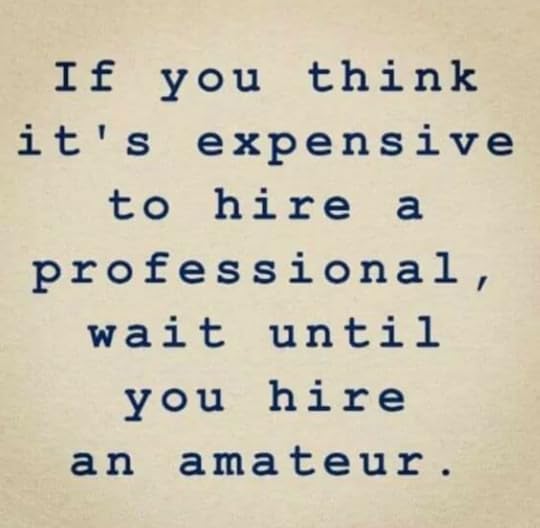
For instance, I’ve seen authors post images of their new book cover and cringed. The cover itself was lovely, but we have to remember how we are selling.
That book isn’t going to be on a shelf where a potential reader is seeing a full-sized version. Likely it will be on Amazon and that beautiful full-sized image, when shrunk to thumbnail size looks like a Rorschach ink blob.
Do you see a butterfly?
No, I see Satan eating kale chips.
If a writer tells me they can’t afford to hire an expert, my response is they cannot afford not to.
Boring Title
This goes along with a bad cover. New writers are notorious for titles that we have to read the book to ‘get’ the title. NO. The title is the hook and we will move on to other writers who don’t make us think so hard.
The Sales Platform
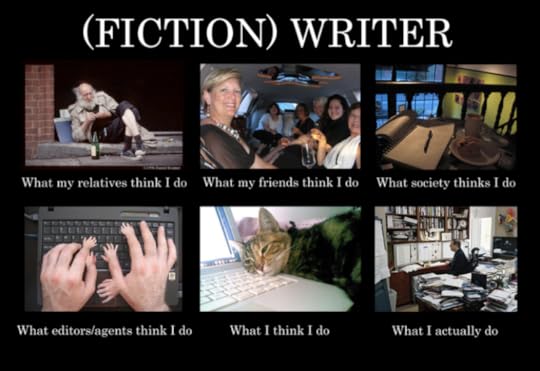
Discoverability is a nightmare. There is a lot of noise and part of our job description now entails branding. This is all writers.
I recently had a distraught writer contact me. The author was recently dropped by a well-known agent because the book simply wasn’t selling. Yet, I could tell with a quick google search what a big part of the problem was.
The author didn’t have platform/brand capable of driving sales. Simply puttering around on Facebook isn’t enough. That isn’t a brand.
My first royalty check would have covered dinner if no one super-sized anything. Why? My book came out before my platform could drive sales. Once my platform improved? My sales skyrocketed.
What does it say in front of every big author’s name? Best Selling Author. Not Best Writing Author.
The writing alone is not enough. Frankly, it never was. Before 2006, writers had a 93% failure rate. Most first books sold less than a thousand copies (even traditionally published books). Only one out of ten published authors ever saw a second book in print. Most were dropped.
In the old days, we just had no control over the brand and the platform. Now, we do. And authors want to complain that it is too hard. Yes, it is hard and there are many reasons this profession is not for everyone.
Less Marketing/More Writing
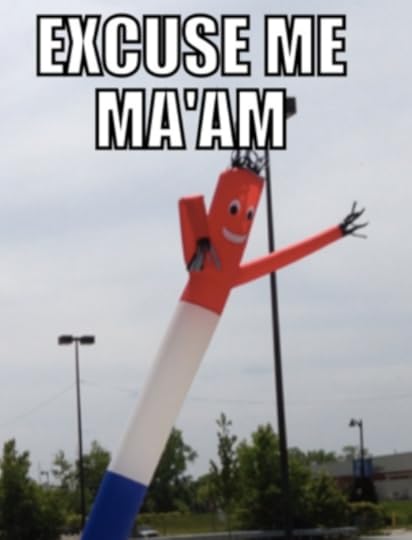 AHHHHHHHHH!
AHHHHHHHHH!Traditional marketing does not sell books. Never has. For more on why, check out Why Traditional Marketing Doesn’t Sell Books. I have had to unfollow writers on Facebook who do nothing but promote one book over and over and over.
They tweet non-stop about their book, and dedicate their blogs to selling books (and that is NEVER the direct objective of a blog). ‘Authors’ deluge us with newsletters we never signed up for and can’t figure out how to escape.
Thing is, we don’t care about you or your book.
***To be fair, you don’t care about me or mine, either 
January 6, 2020
FEAR: Why Humans Crave Stories That Scare Them

Fear is, in all likelihood, the single most complex human emotion. Our fears can keep us up at night, but they can also be the only thing that keeps us alive. They can save us, strangle us, liberate us or even destroy us. Like fire, fear can be intoxicating and even addictive and for sound reasons.
We understand on some primal level we NEED fear—that fear DOES keep us alive and often safe. Fear keeps us within society’s guidelines, since most of us (wisely) are afraid of prison.
We check food expiration dates, pay our taxes, and avoid accepting loans from anyone with ‘THE’ as a middle name, (Vinnie the Fish, Marty the Clown, Jimmy the Snake etc.).
Fear is to thank for many of these sound decisions.
Alas, fear can also be the ‘tame’ tiger who’s our best cuddle buddy for ten years…until it tries to eat our face off. Ask Siegfried and Roy. Thus, fear’s dichotomous and volatile nature can’t help but draw us in like those proverbial (and suicidal) moths to the flame.
A couple years back, I wrote a post about how shame is the beating heart of great fiction. But if shame is the heart, what is the BLOOD? The life force of truly magnificent stories?
My POV? Fear.
Fear IS Fiction
Some folks reading this might have a knee-jerk response of, ‘Oh, I don’t like horror.’ Yet, I want to point out ALL genres hinge on fear. What is a good romance without the fear of never being loved, never finding love, or finding then losing love?
Fear is what adds the breathless expectation, the race to the end turning pages as quickly as we can because we are AFRAID the couple we’re rooting for won’t get their act together before it’s too late.
Whether an MC is overthrowing an evil wizard, stopping a drug cartel, or opening that cupcake shop despite all her family’s nasty barbs and undermining, FEAR is the lifeblood that gives the story LIFE. The larger the fear (and more universal) the more resonant the story.
A Fearful Genre
All fiction has its place. Some fiction is purely fun and escape, and the world needs more fun and feel-good. Certain books are simply a holodeck. These stories allow us a safe space to get away.
Many books offer mental respite from the mundanities of life, a haven where we can regroup after dealing with the overwhelming pressures of being an adult (kids, laundry, bills, car repairs).
These stories serve as a place of rest and we all could use more of that!
But that isn’t all fiction.
Many writers (myself included) desire to go far deeper with our fiction, explore wounds and human issues. We’re compelled to poke and prod at larger social dilemmas.
Stories offer a mechanism where we can ‘safely’ expose that which is diseased and ALSO show these cultural cancers can be eradicated.
Speculative fiction is an excellent outlet for easing our anxiety and that of the reader’s. It’s a genre that is HOT, HOT, HOT due to a plethora of factors including but not limited to: geopolitical threats, global media, living in a surveillance society, loss of privacy, government intrusion, and Facebook.
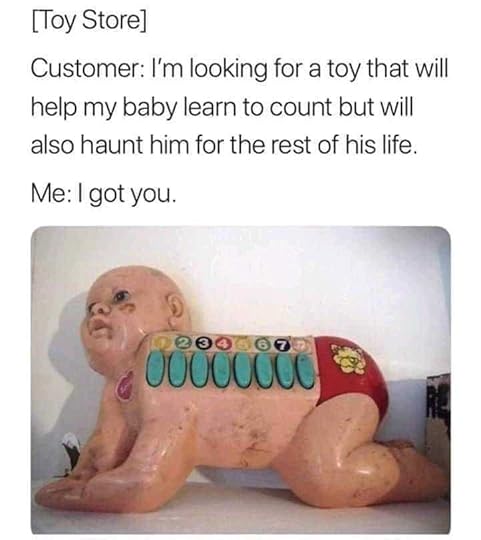 Toy makers…WTH? Seriously?
Toy makers…WTH? Seriously?Then, there’s the constant exposure to every variety of threat (terrorism, politics, pestilence, artificial intelligence, robot girlfriends, Alexa, Siri, Amazon Prime, global warming, and…the Kardashians *shudders*).
I know writers are told not to write for the market, which is partial advice. We don’t ONLY write speculative stories because this genre is exploding in popularity.
If you hate these kinds of stories, by all means, avoid them PLEASE. But, writing is also a BUSINESS and to ignore a genre that is expanding faster than elastic waistbands at an All-You-Can-Eat Chinese buffet is plain dumb.
This genre is blowing up for sound reasons. Speculative fiction (horror is included in this) offers a myriad of ways to help us mere humans face all the stuff we fear the most. It helps us COPE.
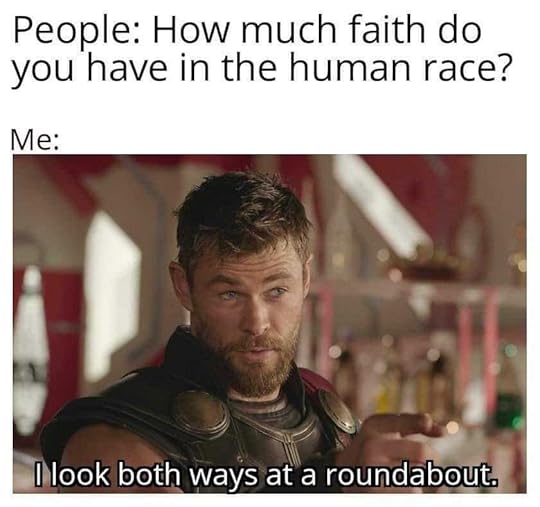
Since fear practically saturates every area of our lives, readers are gravitating more and more to books that allow them to put a face to the fear and then kick its metaphorical @$$.
We can’t do much of anything about escalating tensions with the Middle East or the Fukishima reactors that continue to pollute the oceans.
And, since we DO NOT LIKE feeling powerless, these stories hand us back some form of agency and ease our terrors.
What is Speculative Fiction?
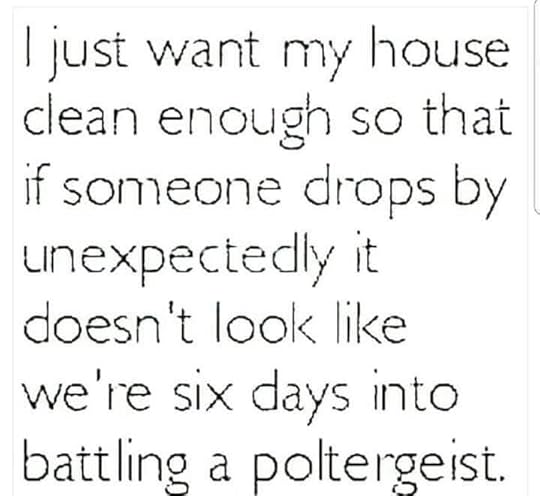 New Year’s Resolution…
New Year’s Resolution…Speculative fiction is an umbrella term publishing uses to describe narrative fiction with supernatural or futuristic elements. This includes but it not necessarily limited to fantasy, science fiction, horror, utopian, dystopian, alternate history, apocalyptic fiction, post-apocalyptic fiction.
Basically, all the weird stuff.
(And forgive me because today we are using seriously broad strokes.)
But what makes the difference between the laughable 1950s science fiction matinees and the long-forgotten pulp fiction versus the works of Philip K.Dick?
What makes The Road literature even though it’s a post-apocalyptic novella? Why is Heart-Shaped Box or Wool so deeply disturbing and simultaneously resonant?
Why do star-packed big-budget films like Jupiter Ascending fizzle? Yet Blade Runner is a science fiction staple worthy of being remade for the newest generations to enjoy?
Plot & FEAR

It’s easy to dismiss speculative fiction as escapist fluff and some of it is. But, when we look to the great speculative fiction, we see the authors are disguising explosive social commentary within narrative so it can be viewed and experienced behind the safety-glass/containment field of story.
By using story, we writers place the reader into this world then (hopefully) generate empathy that is impossible to create any other way. I’ve seen the movie I, Robot countless times and I bawl EVERY time during this scene.
This is me every….single…time…I watch that scene *BAWLS*

Stepford Wives
Was a commentary on the women’s liberation movement. It explored the very real fear of the unknown at the time. Men had no idea how to cope with the new roles and never-before-held feminine powers that had been unleashed.
Before, men could just burn those mouthy wenches as witches. But give them equal rights? *sets down kindling* So much for that.
#Awkward
Animal Farm
Was a treatise on socialism and the dangers of groupthink. The peril that comes with handing over too much power to those who claim to have noble and benevolent intentions without asking the hard questions.
Brave New World
Was Huxley’s stab at a culture propelled by temporary highs, unlimited choices and instant gratification while rejecting that which endured—love, family, marriage—because that which lasted required time, sacrifice and work.
He showed us an eerily accurate picture of what society could become if we were not vigilant…and is now probably rolling in his grave.
*Makes note to write story about Huxley haunting Instagram*
Fahrenheit 451
Was an explication on revisionist history, a culture grounded in fleeting emotion and the superficial. How invaluable books are to the bedrock of a society and how important it is that we FEEL uncomfortable. That being UNCOMFORTABLE is vastly important.
It was a warning, I’m afraid, we’ve failed to heed.
We’re living in a society where we can block, delete and take down content because ‘we find it offensive.’ Speakers are being banned from universities. Or, when they show, they’re met with protests and pepper spray simply because they represent opposition.
In far too many instances (for my tastes at least), any disagreement equals hate speech. Universities label books with trigger warnings or pull them altogether so as not to ‘offend’ anyone.
That, my friends, is exactly what happened in the world of Fahrenheit 451. This goal to make everyone ‘comfortable’ directly led to the implosion of libraries and the university and educational system and the creation of the Firemen who burned all the books (because books made people ‘feel bad’).
I’d suggest reading Fahrenheit 451 with its four walls of television and nonstop entertainment. The seashells plugged into everyone’s ears to pump in more entertainment. I’d suggest it, but…*shivers*
…we might already be living it.
*sobs*
Do Androids Dream of Electric Sheep?
Was Philip K. Dick’s commentary on artificial intelligence and just because we can play God, should we? What sort of moral implications are involved? These are issues we are now facing for real, that are no longer fiction and we are being tasked with the tough questions.
Is it wise to create and sell sex robots that come with a ‘frigid’ setting? What happens when we extend the logic of this? Blade Runner. We get Blade Runner. Also a bizarre escalation/reinvention of the previously mentioned Stepford Wives.
All these great science breakthroughs that float across our newsfeed are now fertile ground for new and possibly even better stories that prod the science with ethical dilemmas.
We (authors) show the world it’s upside down and maybe even ways to right it.
I believe that the great speculative fiction writers have always been the conscience of culture, the voice that whispers things like, ‘Just because we can, doesn’t mean we should.’ Or, ‘This really is a big deal and can go ugly really easily.’
Horror does a lot of that as well. Good horror writers tap into the subconscious angst and give it a face. What happens when society is allowed to continue to devalue human life?
When mobs are handed permission to call the shots? Let’s chat about this after watching The Purge…which ignited enough public frenzy to warrant being made into a USA Network television series.
***Or just hop on Twitter to watch it in real life.
To Make it BIGGER, Make it Smaller
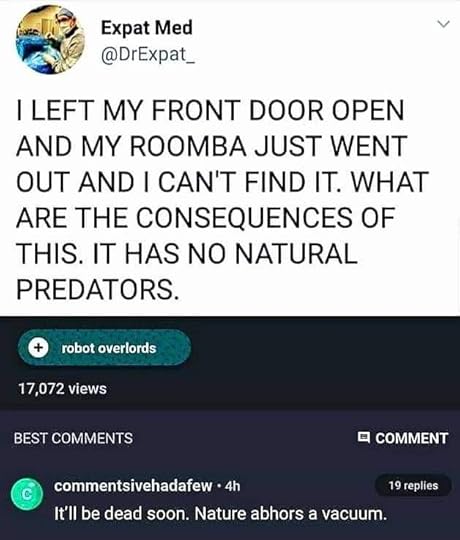
When we care about everything, we care about nothing. Additionally, the human mind can’t truly grasp the loss of a billion lives. It doesn’t resonate because it can’t compute.
Thus the great spec-fic plots make the big small. We tell a small story of one person or a group of people as it plays out on the far larger stage. World War Z anyone?
This is why so many Hollywood movies about asteroids hitting the planet fizzle while The Road simply guts us.
Not All Big Stories are Big
Sometimes speculative fiction isn’t addressing something big, rather it dives into the intimate and deeply personal. Heart-Shaped Box is about a vengeful ghost out to destroy an aging rock star and anyone he loves.
While the supernatural elements are terrifying, what is so beautiful and moving about this story is how the malevolent ghost forces the MCs to face and conquer inner demons they would have been happy to bury…if not running for their lives.
The human story is what elevates this from a forgettable scary book into a work that prods at the deep dark places of the characters (and by extension the reader).
Character & FEAR
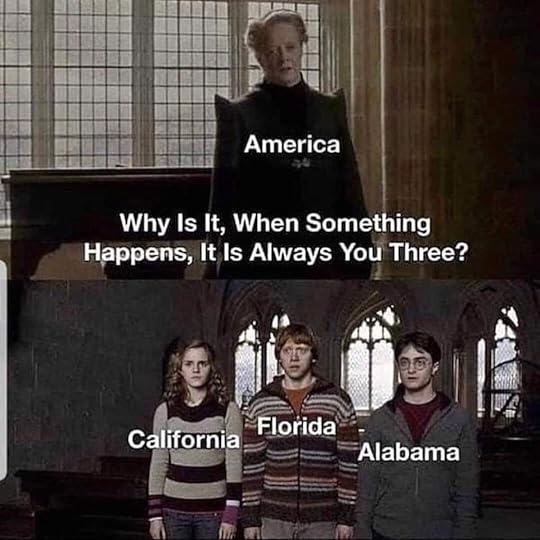
Writing speculative fiction is really tough. It has a lot in common with literary fiction. In FACT, spec-fic in general (INCLUDING HORROR) makes up a very large percentage of what’s viewed as ‘great literature.’ Fahrenheit 451, Brave New World, 1984, Frankenstein, Dracula, The Haunting of Hill House, everything written by Edgar Alan Poe EVER and I could go on.
But won’t 
December 30, 2019
Penguin SOLD: Publishing, Change & Lady Chatterley’s Lover, Oh MY!

This past week, Pearson, the owner of Penguin for the last half-century, jettisoned its remaining stake in Penguin Random House—the book publishing joint venture it formed six years ago with Bertelsmann, the German media group.
According to an article in MSN Money, End of an era for book publisher Penguin:
The company originally owned 47% of Penguin Random House when the joint venture was set up in 2013.
It sold a 22% stake in the business to Bertelsmann, its joint venture partner, for $1bn in July 2017.
Today it sold its remaining 25% stake in the publisher, again to Bertelsmann, for £530m.
Ian King, Sky News
With Borders dead and Barnes & Noble brought to its knees, Amazon is stronger than ever, and indie bookstores and mom and pop bookstores are coming back to life. We are, indeed, living in strange times.
Or are we?
Why So Quiet?

First of all, forgive me for this small segue. Maybe it’s I’ve been a bit off the grid. I’ve been very ill with pneumonia and my grandfather who raised me passed away unexpectedly right before Christmas.
I only knew about this article because one of my followers was thoughtful enough to pass it onto me via Facebook.
Thus, if my analysis is off the mark, I’m blaming it on the drugs. That aside, when I first began blogging, everyone was talking about THE BIG SIX. BIG PUBLISHING. If any major house did anything there was at least some article somewhere.
Yet, when I tried to do further research on this Penguin sale, the ramifications, what ripple effect this shift would have for authors, readers, the market….
Nothing. Not a blog or a blip or a boop. I even subscribe to The New York Times and couldn’t find anything.
ONLY ONE ARTICLE. The one I’ve linked to on this post. Otherwise?
*crickets*
So this is why I am confessing AHEAD of time to being on A LOT…A LOT of drugs, because if y’all have seen the flurry of activity and I missed it, please pass it on to me and accept my mea culpa ahead of time.
I don’t believe I’ve missed anything, though. It’s a sign of how much the industry has changed since I began blogging a decade and a half and almost two thousand blogs ago.
That, and excuse the tinfoil on my head, but the multimedia conglomerates had a LOT of egg on their faces with the whole nasty Barnes & Noble thing. Now that these staple houses are toppling like the proverbial house of cards?
*grimaces*
Not good optics. Maybe just me. Or blame the NyQuil.
Penguin Chic
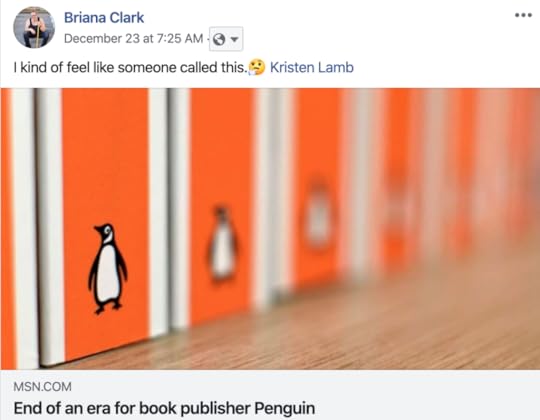 Yes, Bri. Yes I did.
Yes, Bri. Yes I did.Without a flurry of activity to derive a brilliant analysis from—gets cramp patting self on back—I went a different direction. If you read the article I linked to regarding the end of an era (apropos for ending the teens, I suppose) there is a very interesting history behind the creation of Penguin.
Thus, do we ever really END anything? Or is it as the book of Ecclesiastes tells us?
There is nothing new under the sun.
A young director at Bodley Head, Sir Allen, came up with the idea of publishing books for the same price as a package of ten cigarettes after waiting on a platform at Exeter St. David’s station for his train back to London.
Much to his chagrin, he had too much time and nothing to fill it with. No cell phones back then.
He lamented at the paltry selection of magazines and Victorian novel reprints. During that time, books were prohibitively expensive. About 8 shillings or almost $37 in modern currency.
Not only were the books during that time mostly inaccessible to the public, the publishers had to sell at least two thousand copies of any book to break even. Sir Allen had a BOLD idea. He wanted to offer more books at a MUCH lower price to a FAR LARGER audience.
Sounding familiar?
To offer the books at Allen’s comparably rock-bottom price, the publisher would have to sell almost twenty times the volume. BUT, everyday people would finally have better access to a vast catalogue of titles they’d never before imagined outside of a lending library.
Fancy that.
Penguin Breaking the Trends & Rules
 Doesn’t fit blog…but Baby Yoda, y’all.
Doesn’t fit blog…but Baby Yoda, y’all.Penguin’s early catalog included Agatha Christie and Ernest Hemingway. Penguin’s gamble, like Amazon’s, paid off big, because Sir Allen, just like Jeff Bezos, saw a gap in the market and he filled it.
Despite protests of renowned authors like George Orwell publicly decrying publishers having anything to do with this new venture—claiming that cheap books would only devalue them and people would cease to read and all of publishing would collapse—Sir Allen plunged ahead with his plan.
Penguin sold three million books the first year in business.
Apparently Sir Allen wasn’t the only one bored wandering train stations with nothing to read.
Penguin launched a non-fiction division, a children’s division, and, with the meteoric rise to fame and success, even made the bold decision to publish DH Lawrence’s banned title from 1928, Lady Chatterley’s Lover, uncensored.
Fifty Shades of WHOA dass crazy!
This decision, of course, landed Sir Allen in court for breaking the Obscene Publications Act 1959. He (Penguin) was acquitted, the publisher sold a bazillion copies, and the rest is history (pretty much repeating itself).
Blogging Across Three Eras
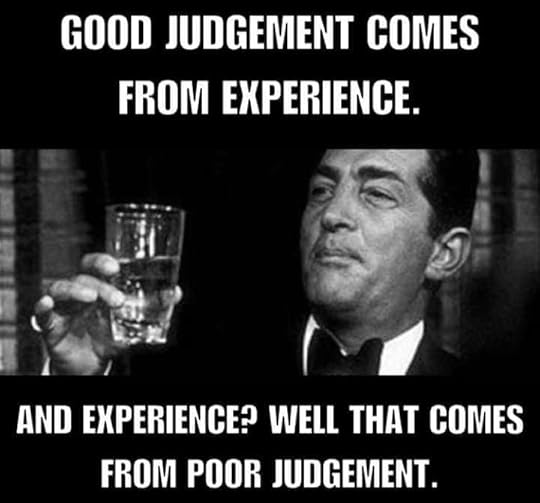
I’ve had the unique challenge/blessing/curse of blogging about publishing since before the rise of digital. I began blogging in the aughts, then into the teens and now will continue into the twenties, assuming I don’t lick any light sockets in the next couple days.
My blogging adventure began on a site called Gather (probably now gathering cyber dust somewhere), then on MySpace. Then, that crashed and burned and I moved to the free WordPress blogging platform, then finally learned my lesson and moved to blogging on my own website.
***Take my blogging class. It’s on sale. Seriously, I did all the dumb stuff so you don’t have to. I will save you YEARS of stupidity.
I blogged about being an ‘aspiring author’ when our prime goal, our ONLY path, was to pass gatekeepers. There WAS no Kindle or Amazon.
Self-publishing was vanity press and meant plunking down over ten grand and all your self-respect and any respect from fellow authors forever and ever AMEN.
Vanity publishing was a death sentence in our industry, unless some stroke of John Grisham luck won you an appeal.
But I blogged on Gather and MySpace that social media WAS going to change the world as we knew it. I asserted that, for the first time in history, novelists had a way of creating an audience BEFORE a novel was even finished, thus vastly increasing odds of success (and was laughed at and y’all know the story).
If you don’t, pick up a copy of my author branding book Rise of the Machines: Human Authors in a Digital World. It’s evergreen.
Platforms change, people don’t. Look up your ex if you don’t believe me 
December 10, 2019
Voice: What is Writing ‘Voice’ & Why is It Important to Storytelling?

Voice. All readers (and literary agents) want to find the next great one, and all writers want to know what the heck it is. If voice were easy to define, then we wouldn’t have dozens of articles, books and classes to demystify the concept.
Today, I’ll put in my two cents and see if I can help some light bulbs go off.
Voice is—in its essence—that uniqueness that we as artists bring to the story. Remember, humans relied on an oral tradition for tens of thousands of years. We are a story people. Voice, in my opinion, is a holdover from that oral tradition.
Ah, but the original storytellers were not only the precursors of the modern writer, they were also the precursor to the modern actor.
I can imagine the one dude in the cave who used the most dramatic gestures and movements, who had the best inflection at just the right time when he told the story. He probably had the largest audiences…the ones who tipped the most.
I don’t care what anyone says, storytellers—WE—are the oldest profession 
December 6, 2019
Five Holiday Challenges Only Writers Will Understand

It’s the holiday season, and this is a tough time for most people. For, writers, it’s peace hell on Earth, largely—though not entirely—due to the whole ‘having to wear pants’ thing.
We authors, historically, have been a misunderstood group of people.
Burned as witches. No holiday there. Survival rate after a political coup? Close to zero. Odds of being shot? Pretty much hundred percent, which correlates closely with odds of keeping mouth shut #FunFact.
Friends and loved ones still invite us to holiday gatherings. Sadly, no ‘burned at stake’ or ‘firing squad’ option. Those require pants, but less talking and no prerequisite to bring some dumb@$$ ‘White Elephant’ gift and a nut-free appetizer.
*makes note to hunt down and murder person who invented ‘White Elephant’ game’*
*Why is the elephant white and not pink?*
*makes note to google that later*
*makes note to put that in novel and kill it*
*along with the person who invented it*
Where was I? Oh yes, holiday stuff. Writers. Why writers should be able to qualify for service animals every year. Holiday honey badgers that bite.
Sips egg nog next to holiday honey badger. No one dares approach. We both leave half lit in Uber. Write glorious prose (me and holiday honey badger). It’s amazing.
While the holidays are hard on everyone, they pose a unique set of challenges for writers. We have to back away from the keyboard, put on pants, and remember what it is to mingle among humankind….
…or mostly why we don’t.
#1: Holidays Are So People-y

Most writers are introverts. We can barely keep up with all the people in our head. And now we have to keep up with real people we can’t control or legally kill, which—trust us—is very frustrating.
If a character doesn’t do what we want them to do? We just toss them off the nearest imaginary cliff.
In life? Good defense attorneys are far more expensive. In a manuscript, we can just write in a billionaire bachelor who falls in love with us and coughs up the attorney fees.
Real life is just such a friggin’ hassle.
Seriously.
In our books, we never have to stand in line or miss a plane. We never have to deal with anyone we dislike that we don’t have the power to destroy.
So, as you see, reality is absurdly inconvenient.
It’s IMPOSSIBLE to ENJOY a holiday when you wait twenty minutes on a parking spot—in the rain—only for someone to swoop in and steal the spot.
Then, you have to park somewhere else…instead of calling down fire from the sky and incinerating them and all they love to ASH.
Seriously. There is zero justice in real life.
No idea why anyone even wants to deal with people without the ability to hex them.
#2: Serial Killers Not a Hot Holiday Topic
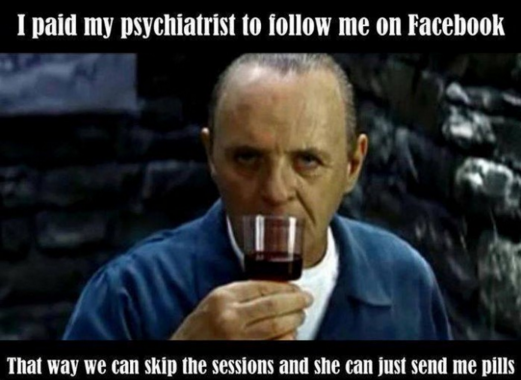
While everyone is sending out holiday cards posing with their kids and pets, your tour of the Ed Gein Murder House wasn’t nearly as big of a hit. Hey, you framed it with garland and lights.
That was festive. Right?
Parties are always a struggle (the pants thing again). No one gets your veiled references to Silence of the Lambs because, hey, you did bring a ‘nice chianti’ and a fava bean dip *wink wink*.
Sigh.
While the guys were going on and on about football and women chatting about shopping, all you can think about is how badly you wish you were home watching Dexter.
No pants required.
#3: Pretending to Be Normal
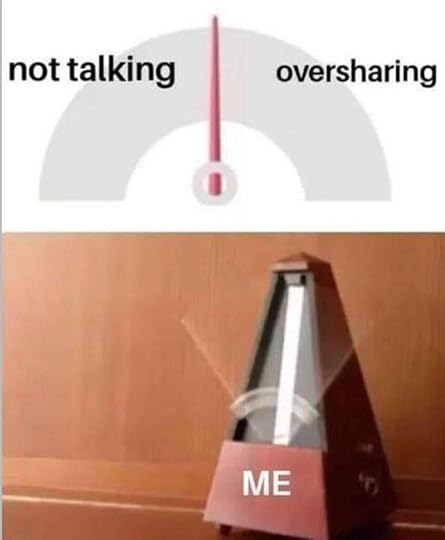
This is enough to make the best of us snap on a regular day. During the holiday season? *weeping* Most of us ended up authors because we finally came to the realization that the ‘Normal Ship’ sailed without us long ago.
Some of us are secure enough to wave that freak flag high…but not all of us.
And even the most brazen of us weirdos do try to at least make an effort to blend in with the ‘norms.’ Seriously, for all the regular people reading this? Y’all have NO IDEA how hard that %$#@ is.
Not correcting poor grammar? That alone should earn us a friggin’ medal.
***Clothes are hung. People are hanged.
When you’re at the gym and the anchor announces there is a serial killer on the loose and you fall off the StairMaster shouting, ‘It’s a SPREE KILLER, YOU IDIOT! Read Anatomy of Motive you mouth-breathing troglodyte!’
Yeah….
Not allowed back at that gym again.
#4: Pay Attention When Others Talking
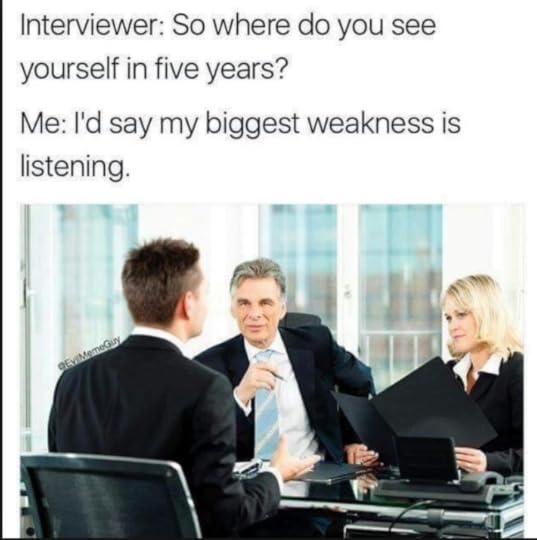
Most of the year, we writers are fairly good at hiding. Holiday gatherings force us out of our tunnels.
Paying attention to anything NOT a book or writing a book is already tough. Listening while people talk—that isn’t a lecture on the history of stringed instruments or the evolution of bladed weapons—is arduous.
This is particularly applicable to those of us who write full time. We pretty much are always reading, writing, eating, or sleeping. Our world is very much in our heads. Many authors (not all) are also…crazy as a $#@!house rat.
Not a prerequisite, but it helps.
Meaning there are a lot of writers who happen to be ADD, ADHD, OCD, on the autistic spectrum, or who happen to like glitter way more than is healthy (*looking at you Jenn C.*).
I happen to be severely ADHD. Anyway, when you’re ADHD a lot of people believe that you’re like a spider monkey on crack—which is only partially true.
I gave up crack in college.
Kidding.
I’m too cheap to buy crack. Dealers don’t take coupons.
Anyway, we vacillate from being all over to being hyper-focused. When I’m on point, the house could burn down and I might not notice. In order to manage my ADHD, I use A LOT of timers and am a multitasker.
Doing more than one thing keeps me focused. I don’t even pretend to understand it.
So, if I have to do laundry, I will put on an audiobook so I don’t wander off and start painting the bathroom.
If I have to talk on the phone and actually listen to the person, I will fold laundry so my mind doesn’t drift.
This means, I have a VERY difficult time paying attention to people when they are talking if I am not also doing something else. So like I might crochet while holding a conversation.
WHICH, if the other person doesn’t understand? Comes across as me being rude.
Thus, the holiday season is a nightmare because, for me at least, I might as well keep a pocket full of cards reading:
Don’t be weird.
Inside words stay inside.
Remember to liste—OMG! JEFFREY DAHMER!
#5: Hiding Glee About New Plot Ideas
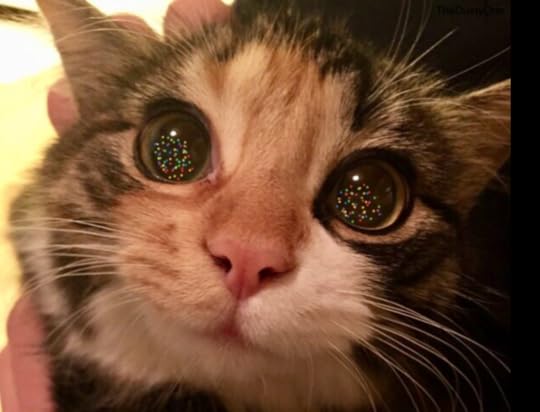 Writer’s face when hears next plot idea in a conversation….
Writer’s face when hears next plot idea in a conversation….Writers have NO poker face. We are an open book, pun very much intended. Though not a hard and fast rule, we’re right below the chess club and slightly above the mathletes in social ineptness.
So when we hear a GEM of a story idea drift through the conversation at a party….
Yeah that meme floating around about that cat that saw the Christmas tree for the first time? That was fake news. The cat actually was doing the world’s most perfect impersonation of an author who’s just overheard the greatest plot twist EVER.
We get that joyful glazed look where we stop chewing our cookie and crumbs fall onto our chin and down our shirt. At which time the other person laughs awkwardly and says, ‘You’re not going to, like, put me in a book, right?’
Then we (the writer) *fake laughs* say, ‘Gosh! No!’ First of all, writers LIE. We deal in LIES, so don’t fall for it.
Also, as a disclaimer…
You have the right to remain silent or leave us off the guest list. If, however, you invite us to a party, force us to wear pants and talk to people, anything you say can and will be used against you in a work of fiction.
You have a right to preorder. You have the right to buy in paper, audio or hardcover. If you cannot afford the hardcover, the option to buy in digital will be provided for you. Do you understand these rights as they have been written out for you?
In the End
Maybe y’all aren’t as socially awkward as I am. Yes, I’m funny, but I can be overpowering and leave people needing a nap…or a bottle of Xanax. I struggle with balance, tend to talk over people and am…well what is the word?
No, the one that I can use in a PG-13 blog.
Extra.
I celebrate the holidays in my own way…mostly watching Muppets Christmas Carol over and over until my husband threatens to divorce me.
Then we switch to Krampus.
I’m still a work in progress at remembering to take turns, that ‘inside words stay inside’ and that—SIGHS—‘not everyone wants to talk about autopsies over seven-layer-taco-dip’ (though WHY I have NO idea) *rolling eyes dramatically*.
I’ve come to grips that I will never fit in, never be ‘normal’ and frankly? Normal is a setting on the dryer so *fair flip* WHATEVS….
*flounces off to watch Forensic Files from blanket fort wearing unicorn pajamas*
Y’all invited.
In the meantime….
Give yourself some goodies for Christmas. PANTS OPTIONAL!
I also have some treats, like a BRAND NEW class I’ve never taught before, and it turned out FANTASTIC. OMG BEST CLASS EVER for my FREAKY FRIENDS!
BTW WE FIXED THE API ERROR! Stripe was giving an API error for some of y’all trying to buy classes and we FIXED that! So get these classes while they are on sale before they are slated for deletion of stuck in cold storage.
ON DEMAND Dark Arts: HOLIDAY SPECIAL Building Your Villain is usually $55 and for the next few days is only $25. Three hours of psychopaths, sociopaths, narcissists, pathology and how that applies to writing.
It is like the Behavioral Analysis Unit for Authors. Tres FUN! Villains are some of the most enduring characters in literature. Why not add your own legends to the list?
I’m also offering ON DEMAND! Holiday Sale! Story Master: From Dream to DONE. This class is to train you how to plot whether you’re a plotter, a pantser or a mix of both. It’s also a crash course in creating dimensional characters.
I love hearing from you!
And to prove it and show my love, for the month of DECEMBER, everyone who leaves a comment I will put your name in a hat. If you comment and link back to my blog on your blog, you get your name in the hat twice. What do you win? The unvarnished truth from yours truly.
I will pick a winner once a month and it will be a critique of the first 20 pages (5K words) of your novel, or your query letter, or your synopsis (5 pages or fewer).
In the meantime, PLEASE treat yourself to a class! We have a TON of classes that we will be deleting or putting into cold storage come January and will no longer be available. So STOCK UP while you can.
The BIG SPECIALS (other than what I mentioned above)
On Demand: Beyond Bulletproof HOLIDAY Barbie
Usually $55 and now only $25.
This is a THREE-HOUR class on guns, knives, weapons, fighting, law enforcement (from local cops to international espionage) and more. Everything you need to build a bad@$$—male OR female—and get the details CORRECT.
Spilling the HOLIDAY Tea: On Demand Blogging for Authors
Usually $75 and now only $40.
Get prepped and ready for the new year, new you, new blog.
New Classes NEXT WEEK FREE RECORDING INCLUDED
Tick Tock: How to Plot Mystery Suspense Series
Thursday, December 12th, 7:00-9:00 p.m. EST (NYC TIME). Use New20 for $20 off.
Can You Hear Me Now? Developing Character Voice
Friday, December 13th, 7:00-9:00 P.M. EST. Use New10 for $10 off.
NEW ON DEMAND CLASSES
Bite-Sized Fiction: How to Plot the Novella
Use New20 for $20 off
Why Are We HERE? Scenes That HOOK
Use New20 for $20 off
Popular On Demand Classes
The Art of Character: Writing Characters for a SERIES ON DEMAND
Use Binge10 for $10 off.
How do we create characters that readers will fall in love with, characters strong enough to go the distance? Find out in this THREE-HOUR class that also comes with detailed notes and a character-building template.
This class dovetails with my previous class:
Bring on the Binge: How to Plot and Write a Series (ON DEMAND). Use Binge10 for $10 off.
Need some help with platform and branding?
Branding: WHEN YOUR NAME ALONE Can Sell (ON DEMAND)
Use brand10 for $10 off.
For the complete list, go to the OnDemand Section.
The post Five Holiday Challenges Only Writers Will Understand appeared first on Kristen Lamb.
December 4, 2019
Unplugged Book Sales: Is It Possible to Sell Books Off-Line?

Unplugged and Internet-free. Sounds like heaven to me. Why am I posting on this? Well, someone in the last post commented and asked me to blog on how to sell books without the Internet or social media. If it was even possible.
#ChallengeAccepted
Is it even possible to sell books unplugged? Good food for thought. Of course, my first thought was, ‘Is it even possible to get unplugged in the first place?’
Funny to think that it wasn’t too long ago that a half-baked plot with a terrible love story captured our hearts. A horrible movie (by all accounts) made us all misty-eyed, because of these three words…
You’ve Got Mail...
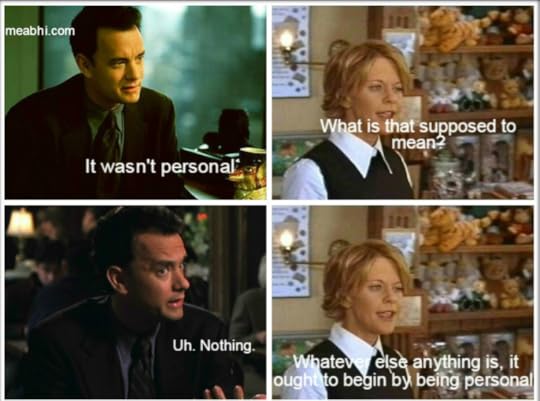 So prophetic, Kathleen.
So prophetic, Kathleen.I remember the giddy feeling whenever I’d hear that ping. Someone sent me an EMAIL. OMG!
I’ve got…MAIL!
Now? I’ve got mail.
*weeps and drinks straight from the Hershey’s syrup squeeze bottle*
I remember loving email.
Hell, I remember LOVING the movie The Matrix. You wanna know WHY I loved The Matrix? Because I wasn’t LIVING IN IT.
I miss being unavailable. My Yahoo email went feral about four years ago. It pees on the carpet and bites people, so we leave it alone.
Same with my Gmail. No matter how many systems and filters…the spammers find me.
There is no way I’ve found to remain unplugged…even a little.
Now? My business email is close to joining the Yahoo and Gmail. If I am not on my cell phone deleting spam messages like Satan’s version of Space Invaders?
I lose stuff.
No joke. I had to create another business email (which, of course, I forget to check). It’s a never ending game of Hell’s Whack-A-Mole.
Oh, and I recently got sick, and couldn’t cull the endless author newsletters I was force-added to against my will because so many @$$hat branding gurus swear by newsletters as the key to wealth and fame to the point they are SELLING email lists to total strangers.
People like me who want some unknown author’s free book about as much as I want a free upper G.I.
Kill. Me. Now.
#IWillNeverEscape
Unplugged Life

I’m a Gen Xer. We’re the sarcastic middle child who trusts nothing and no one, crushed and forgotten between the Baby Boomers and Millennials.
We’re young enough that we were a major force that set off the digital revolution. Yet, we’re also old enough to remember what life was like before computers.
Which is why we drink heavily or want to.
We remember what it was like to have to walk over to someone’s house, knock on a door and ASK IN PERSON if they wanted to hang out. Or, to CALL. And if the person wasn’t there, to have to…wait for it…call back LATER.
There weren’t even answering machines.
Hell, there wasn’t even ‘call waiting.’ You got a busy tone. Oh, the things my son (Spawn) won’t ever experience.
We lived our lives unplugged, not even knowing we were ‘unplugged.’
Now we track everything from packages to exes. These days, I can’t even have a conversation in the car that suddenly there aren’t ads popping up in my feed for something I was just talking about.
#CreepyAsHell
There was a time I TRIED to remain unplugged. I refused to use email and wanted all my bills on paper. I’d reset all the settings on my phone and clear browser histories, and… *taps out*
Problem is, everything is optional…until it isn’t.
Want to get really freaked out? Go read Fahrenheit 451. These days, I’m too old to mess with it and as a writer, I find great entertainment researching murder and poisons on-line just to see what sort of ads pop up on Facebook.
Apparently a LOT of ads for pre-paid legal, therapy, and hardware stores. I wish I were making this up.
Can We Even Live Unplugged?
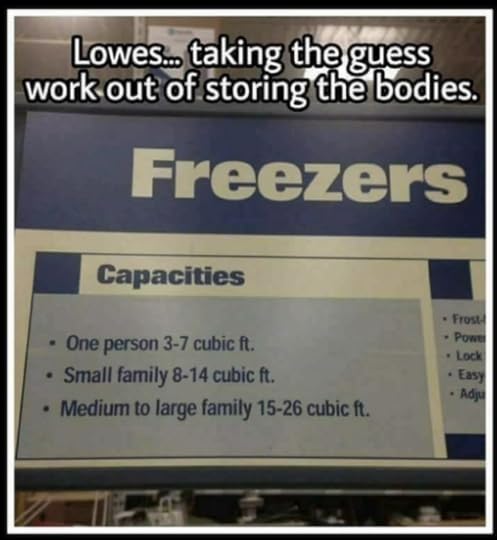 Where else will I find people who share my socially unacceptable sense of humor?
Where else will I find people who share my socially unacceptable sense of humor?Not to freak y’all out, but before we even posit the question if it’s possible to sell books off-line, we need to ask the critical question. Who’s even living off-line? Because if Ted Kaczynski (the Unabomber) is our target market?
Then there ya go!
But, even Ted communicated using the newspaper, which was the equivalent of the Internet during his day. He put out personal ads searching for a wife who wanted to live off the land, cut off from the world.
Wonder how many of us might take him up on that these days?
Considering that most of today’s population is glued to their phones, addicted to Instagram, Facebook, YouTube, and blogs to the degree that specialists are treating new never-seen-before joint, back, eye, and psychiatric disorders….

Whether we like it or not, folks these days aren’t sharing word of mouth in person as much as they’re sharing among peers their on-line social circles.
***To be clear, this doesn’t mean they’re NOT sharing in person, just proportionally they’re sharing more on-line.
Additionally, people are shopping more on-line than in stores.
It’s why Cyber Monday has been beating out Black Friday by increasingly larger margins every year.
Not only are the deals better, but there’s also the added convenience. I’m just as guilty. For instance, Spawn’s birthday is RIGHT near Thanksgiving.
I didn’t have time to cook, work, write, clean, and shop for birthday gifts. So, I hopped on Amazon and ordered the game he wanted…which was delivered to my front door while I frosted his birthday cakes.
In sales, we had a saying, ‘Fish where the fish are.’ Safe bet the fish are schooling on-line.
Bookstores & Location

Though, for NOW, I think it will be tough to sell books unplugged, that trend should shift. The reason? Borders and Barnes & Noble decimated the indie and mom-and-pop bookstores.
Granted, CBS recently reported some good news (which I also predicted on this blog a few years ago *gets cramp patting self on back*).
The small bookstores are booming after being nearly wiped out, which is fabulous.
The problem is that the big box chains all but annihilated these small stores, and there is a LONG road back from the edge of extinction.
Consumers will eventually shop at bookstores, but, as the founder of Barnes & Noble realized only after it was far too late, shoppers tend to gravitate to the store that is closest and most convenient.
In the October 21, 2016 article in The New Yorker, What Barnes & Noble Doesn’t Get About Bookstores, Leonard Riggio, the man who bought Barnes & Noble forty-five years ago and turned it into a giant finally conceded this mistake:
The No. 1 consideration of where someone will shop is how close it is to where they are. It has nothing to do with pedigree or branding. If there’s no bookstore close to them, they’re more likely to buy online. If there’s one close, they’re more likely to buy if it’s a block away.
While we await the recovery of the local ‘Shop Around the Corner,’ odds are folks will mostly buy on-line. That’s business reality.
The Centrifugal Bumble-Brand
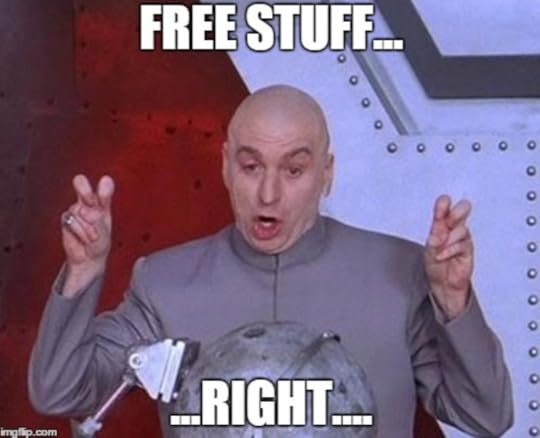
There are all sorts of gurus who’ll sell authors (or anyone) snake oil a sure-fire get-rich-quick scheme for using social media to make the big lists, sell so many books, etc. etc.
Mailing lists, pay-to-promote, ads, marketing campaigns, on and on!
I’ve never done any of this, and my blog gets well over a million unique visits a month, which is pretty good for a blog with such niche content for a niche audience.
My book and classes are fun and never go out of style because the focus is on people, not technology.
What captures people’s attention? How do we make them care? If we have to use social media, then how can we find our tribe? And have FUN and time to write books?
What can we do to attract those people who like what we like and are most likely to enjoy our content and probably enjoy our stories, too?
CLUE: How about post stuff they WANT to see and SHARE? Imagine that!
Technology changes, people don’t.

Whether we are plugged in or unplugged, how we interact with people is roughly the same if we want to be successful.
Even before social media, we didn’t like people who only talked to us when they wanted something.
We were NOT fans of people who were constant sources of drama, negativity, self-centered, manipulative, the list goes on.
We enjoyed people who made us laugh, who noticed US, who were genuine, who asked us about our day and our life (without an agenda) and who listened, instead of everything being about them.
Even before computers, we liked people who made us smile, who made our day better just being around them.
We ran from people who drained our energy, who took more than they gave. People hung out with people who shared at least some common interests, with just enough variety to add something new and exciting.
This has nothing to do with SEO.
Well, not directly. Humans are the same on-line as unplugged. They don’t want someone trying to sell them something all the time, etc. etc.
#Duh
Relax on social media. It’s really what we used to do off-line only on-line. Yes, we have to filter it, but we had to filter it at parties if we wanted to be invited back, right?
Remember, we aren’t trying to make EVERYONE happy. We CAN’T.
For instance, if you don’t have a dark sense of humor, you’re probably not going to enjoy my books either. I can’t please everyone. But when I please the right people—MY audience—they do the heavy lifting.
Like here…
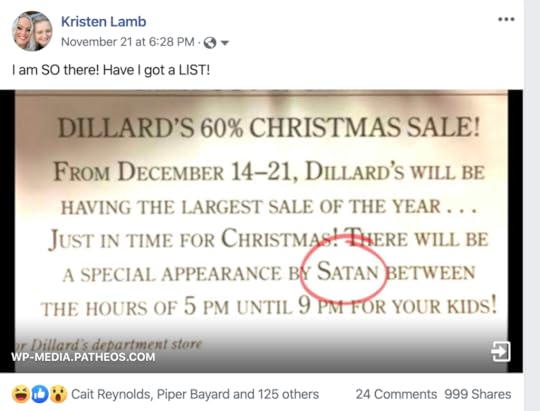
Almost a thousand shares and I didn’t have to pay Facebook a dime. Here’s the thing. My goal is not to sell this blog or my classes or my books to EVERYONE. I can’t please EVERYONE, so I don’t try.
But I CAN please YOU….
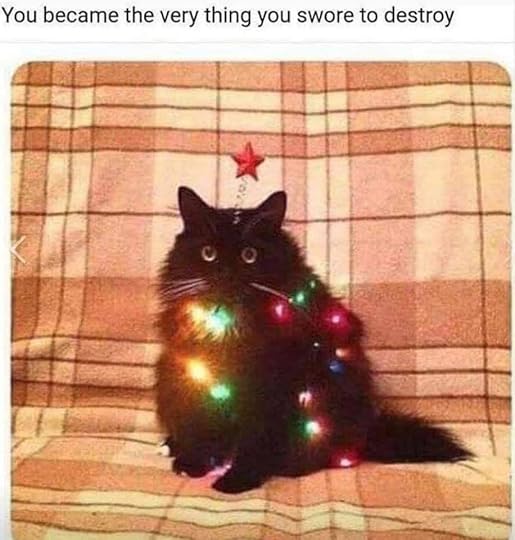
And probably even you…

And you…over there.
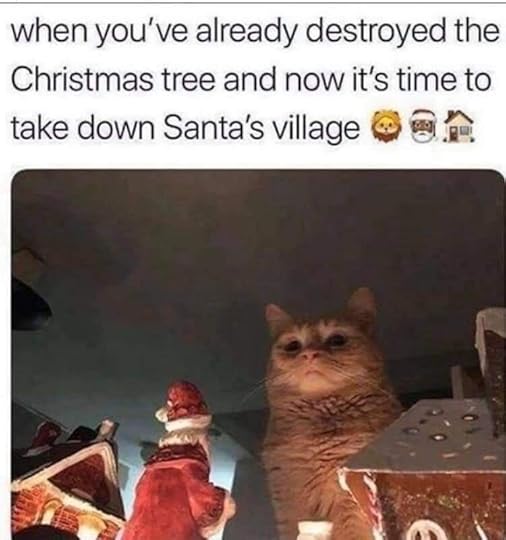
Yes, I have seven cats. Actually six. My *whispers* dog, Pippa, thinks she is a cat. Don’t tell her.
Anyway, what were we talking about before all the funny cats?
Oh yeah…no social media.
How would we share cat memes?
That and right now I started a pretty hysterical (and morbid) thread on Facebook that might earn us all an FBI van for Christmas….
*tugs collar*
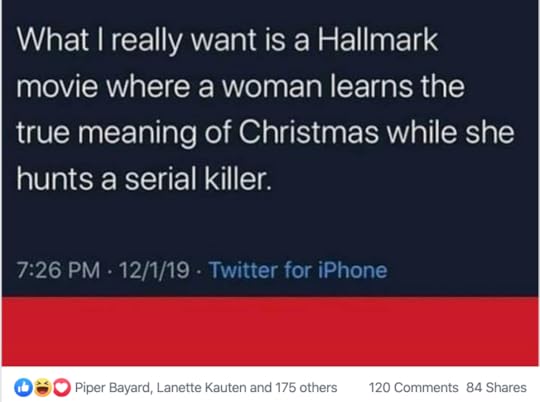
But the comments are too funny! See? No marketing gimmick, just people having some seriously dark and disturbing fun.
I write mystery, suspense and thriller so those are the sort of people who are my audience. Many of the people in the thread having a good time, I KNOW FOR A FACT are not writers. They are READERS (or potential readers).
Which means these are the folks who DO go over and like my fan page and who DO subscribe to my blog here.
#TrueCrime
Oops, I meant #TrueStory.
Anyway….
Storytelling Unplugged
I know I’ve danced around the question, though I’ve not meant to. Can we sell books without social media or the Internet? Sure.
But for most writers who break out in hives at the mention of sales, the idea of setting up a table in some store and hawking a book with a PayPal card reader pales in comparison to building a social platform.
Thus, the only remaining way to sell books off the Internet (unplugged) is through the quality of the story.
We must write something SO spectacular, so singularly unique and well-crafted that it stands out like the Hope Diamond perched, glinting in the sunlight, on a pile of rubbish.
It must be so brilliantly crafted that it generates a tidal wave of buzz among readers, and then eventually the booksellers in the emerging small bookstores. Stories that booksellers will not only stock, but will go out of their way to recommend to the browsing shopper.
Writing Unplugged
This said, judging from most of what I see? The future is not looking too bright for most writers.
With the rise of self-publishing, it’s been too easy to skip the hard parts….like learning how to write well.
When I began as an editor almost twenty years ago, the samples I received were trying to pass a NY gatekeeper. Now? Most wouldn’t pass 7th grade English.
It’s downright depressing.
I encounter far too many ‘authors’ who know more about advertising and marketing than they know about story structure, POV, pacing, scene and sequel, etc.
Instead of reading, taking classes, applying what is learned to writing and then rewriting and practicing, too many authors are fixating on-line.
They’re more concerned about building numbers on their mailing list, their book covers matching their Facebook headers than whether or not the ‘books’ they’ve already produced are even readable.
They spend more time worrying if they should shift to Instagram than trying to understand why no one’s buying their existing books.
The hard truth is great writers do what anyone who’s a master at anything does. They make writing appear easy just like an Olympic gymnast makes the parallel bars seem easy.
Writing a novel is anything BUT easy. This is a skill that takes time, training, blood, sweat, tears, mentorship, and probably part of your soul to even become moderately good.
When we skip steps—either out of pride or impatience—there are consequences.
The most common consequence is our book will die a lonely death in obscurity. What is ignored offline will likely never thrive online. So YES…
Book Sales Unplugged
The technically correct answer is that we’ve long passed the event horizon that any sale happens off-line…technically. We’re living in a world that, short of a zombie apocalypse or a. nuclear war, the Internet will be a factor in the sale somewhere.
BUT…before the Internet ever gets a vote. Before Insta-Snap-Chat-Face-Twit is ever part of the equation, a story starts with us. The author.
Every sale happens offline when we write the book. Then, when the reader reads or listens to our story and our story makes their heart beat faster, keeps them up all night and generates so much excitement they cannot WAIT to tell someone?
That is the books sale unplugged. We have to get booksellers excited enough to be a street team without us even having to ask or offer an incentive.
They’ll VOLUNTEER. The best sales are always a passion project anyway.
In the meantime, READ, READ, READ. WRITE, WRITE, WRITE. READ, WRITE, FAIL, REPEAT!
And know I’ll never fuss at y’all without offering help 
November 21, 2019
The Winning Edge: In a Glutted Market, How Can Authors Stand Apart?

The winning edge is what all humans crave, whether it’s at work, love, life, or even just for that spot at the front of the line in Starbuck’s. People go to CRAZY lengths to gain that winning edge, especially when margins are razor-thin and stakes are sky high.
A long list of ‘doping’ scandals’ shook professional sports not too long ago, reducing rock solid reputations to dust. Corporate giants have fallen, their leaders thrown in jail because they chose shortcuts over creativity and ingenuity.
Insider trading. Backroom deals. Brokering in secrets.
Writing and publishing, sadly, aren’t much different. There are folks out there who sell packages that guarantee to make you (or me) or anyone with the cash or the card that clears a New York Times Best-Selling Author.
Wish I were kidding.
Ever since our profession has gone digital, it’s been far easier to game the system. Now, make no mistake. It was certainly NO meritocracy before. I merely said digitization has made it easier to game.
Though why anyone would feel proud of a ‘trophy’ they’d bought is beyond me. This said, just because some people are engaging in algorithmic alchemy doesn’t mean everyone is.
Plenty of room to earn our titles the good old-fashioned way.
We Are What We SAY We Are

I pull this trick on every conference I speak at. It’s a whole lot more fun (for me) if the audience isn’t filled with longtime followers of my blog.
The single largest hurtle many writers have to overcome—serious writer, not entrepreneurs using my professions as some scratch-off ticket to fame and fortune—is to actually CALL themselves writers.
I will ask for all the aspiring writers in the room to raise their hands. Then, once they do, I tell them to use that hand and slap themselves HARD and never call themselves that again.
Feel free to use the term ‘pre-published’ or if you’re an overachiever like me? ‘Pre-legend’ will work too. But for the love of all that is chocolate, ditch the aspiring.
This is a brutal profession and apologists will get eaten for breakfast. I’ve seen writers who’ve penned tens of thousands of words who still refuse to call themselves writers.
To be perfectly blunt, I am seeing a lot less of this than I used to with self-publishing as an option. But, that cloying insecurity is still there.
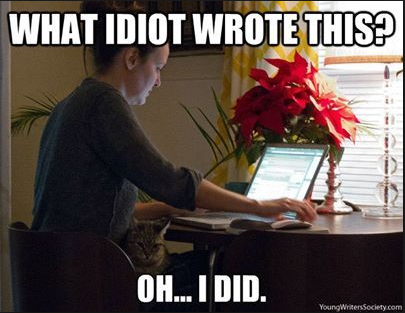
So long as we cling to the aspiring then we don’t have to write every day. Investing in training and classes is an option not a mandate. Reading books is a frivolity, not business training.
Aspiring writers will always be just that…aspiring. There is not implied action in that word. Pre-published presupposes a promise.
Additionally, we are what we do.
If I told you I was a doctor, but then you found out I never went to med school, didn’t have an office, had never treated a patient, you’d think I was a lunatic.
Writers WRITE.
Winning Edge: Preparation
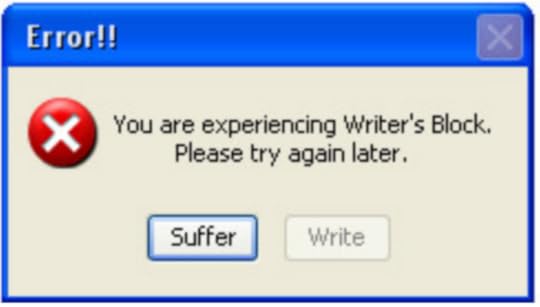
Also, the day you decide you maybe want to make money doing this writing thing professionally, you need to invest in YOU and your business.
This means you need a website, to start building a brand, cultivating a platform (which is code for just keep talking to people and make friends on social media).
Yes, I hear the protest. But I haven’t even finished a book! All right. So you DO finish a book. Say you run into an agent who LOVES it. Do you REALLY want to try and pull a website/platform out of the ether?
Look in my eyes. The answer is no.
You’ll thank me later.
If you query traditional or a good indie and don’t have a website and platform, I can tell you right now that’s almost always an automatic trip to the slush pile. Also, if you publish yourself, where are you going to sell your book(s)? And to whom?
Trust me. I have done all the dumb stuff so you don’t have to.
Branding and building a platform is a) something only YOU can do b) you cannot buy one or outsource this task, either c) it can be fun d) it’s way easier and a lot less stressful when you don’t yet have anything for sale.
My book, Rise of the Machines: Human Authors in a Digital World was written to be evergreen (meaning the content never gets old).
It works on any platform in any time period because my approach focuses on PEOPLE. Technology changes. People don’t. Don’t believe me? Look up your ex on Faceook.
You’re welcome.
I teach how to locate your future fans. Why do they like what they like? WHY? How can you find them, connect and cultivate a relationship that will endure?
If you want a winning edge, then building a strong cadre of people who care about YOU, your book and success will launch you light years ahead of those who believe they can simply throw money at a bunch of ads and buy email lists.
Winning Edge: The ‘Competition’
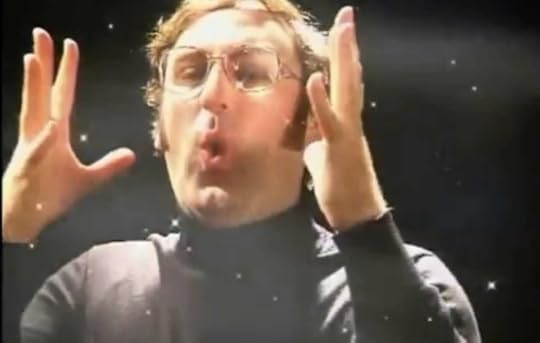
Here’s where I’ll probably sound like a jerk but I have no figs to give. Barnes & Noble is on life-support. It might survive, but will likely never again be a baller. Big Publishing hasn’t had a breakout novel in nearly EIGHT years now.
The glut in the market has become unmanageable. In the early days of self-publishing and indie publishing readers could discover the gems, but now it’s too much. As I’ve mentioned more than a few times, there are now over a million self-published books launched per year.
It doesn’t take a mathlete or an economist to appreciate that, if only 3-5% of the population considers reading to be a favorite past-time, that they simply cannot make it through over a million books a year to discover the gems.
But, good entrepreneurs are problem solvers. How can WE solve this problem of over a million books added to the market per year?
Well, the entities that allow self-publishing won’t likely do anything because even if a really dreadful book sells ten copies they’re still making a lot of money.
That, and I loathe handing power over to other people. I’m a tad of a control freak. Yes, I see your shocked faces.
The winning edge we have here is that most of those million plus books are unreadable GARBAGE.
Winning Edge: Quality Beats Price

Yes, in the beginning of the e-reader, we wanted cheap books because they were novel (*bada bump snare*). We still do, to a degree. I still believe that a digital book shouldn’t cost the same as a hard cover.
A hard cover costs in paper, shipping, it can be damaged and is perishable. This said, I am happy to pay a reasonable price for a digital book, just not $27.00.
Back to cheap books. We were enamored with .99 cent books and FREE books largely because NY was staffed with Luddites who didn’t realize the Titanic was sinking.
Instead of changing business plans…the band played on.
Amazon was more than happy to accommodate. But, after a while, the novelty wore off. Especially once we realized that so many of these books were unreadable junk—unedited, first-draft, digitized offal.
Much of what’s out there still is. And, traditional publishing, in trying to up their speed, has compromised a lot of quality as well. I’ve found myself reading a lot of older books (pre-digital era) because I can’t stand modern books.
If readers discover we put out QUALITY books, we will automatically be at the leading edge of the pack. The reason is readers don’t have time to sift through Hell’s Slush Pile.
Value the Readers’ TIME
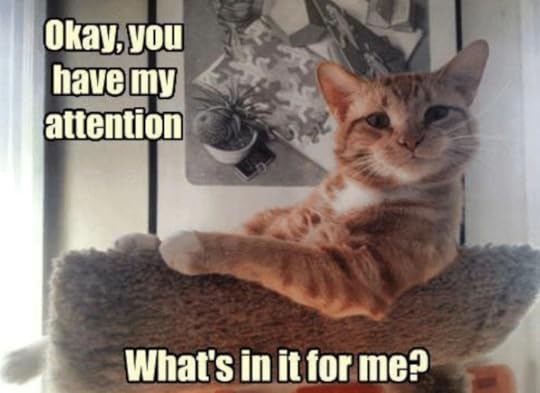
Publishing has ALWAYS complained people didn’t read enough.
Those stupid radio programs are stealing readers.
That silly new television is taking readers.
Twenty-four hour news and cable! Stealing our readers!
Publishers have griped and groused that people didn’t read books and that was back when there sure as Shineola wasn’t over a MILLION friggin’ books hitting the market per year…most UNEDITED.
Most of the books for sale today? Forget passing a gatekeeper. Most couldn’t pass fifth grade English. But here’s the thing.
People are BUSY.
We are wanting them to READ. If we want them to read, the we need to make sure we’re valuing their limited time by offering them an escape…not a migraine.
I hate saying this, and honestly never believed I ever would. But if writers would do these three things, you would outpace probably 95% of what is for sale.
First, read A LOT of books. This would give you a vast vocabulary and you’d be able to study how masters of what we do use words to create emotions, atmosphere, effect, tension, etc.
Secondly, invest in training, conferences and/or read and study the top craft blogs and books. I gave a GIANT list on this post.
Thirdly, write A LOT. I was going to end the Plot Boss ON DEMAND tomorrow night, but since I am mentioning it here, I’ll go ahead and end it MONDAY. Because if you don’t take any other craft class take this one.
***If we don’t understand the structure of stories we’re DOOMED. This is a $55 class I’m offering for $25. You can get it HERE.
After years writing myself in corners, I dedicated to learning EVERYTHING about plotting because it confused the bejeezus out of me. Once I reverse engineered what I’d been doing all wrong, I devised a way to teach it where even me—a plotting dimwit—could understand.
You guys having seventy-six half-finished ideas in your computer doesn’t make you a stronger author. It makes you want to cry into a tub of ice cream and buy crap you don’t want or need on Amazon Prime.
Finishing books makes you better (and improves your confidence). Finishing sucky books leads to finishing good books and that leads to finishing incredible books…and THAT is the winning edge.
Remember QUALITY

A caveat of finishing. I’m going to reiterate the importance of study. Reading is vastly important. I cannot tell you how many ‘writers’ tell me they want to be a ‘New York Times Best-Selling Author’ but then in the same sentence claim they don’t have the time to read.
*primal screams*
If you don’t have time to read, then you don’t have time to be an author. Initially, I wasn’t keen on audio books. I had to train my brain.
I’m a writer, blogger, teacher, and a mom who homeschools. That, and, judging from the piles of laundry in my house, there might be people living here I don’t know about.
 My recent reading stats. Works out to 3-4 hours a day every day.
My recent reading stats. Works out to 3-4 hours a day every day.Sure, I had to get used to it. The books I particularly love, I buy again in paper. But, I can do laundry, dishes, clean, or stand in lines and listen to books.
I just want to be very clear on the finishing thing. There are plenty of writers churning out finished ‘books.’ But they aren’t books, they are 50,000-110,000 words with a cover.
What we practice is what improves.
If we don’t read great books and take classes from those who can improve our skills, what we are doing is practicing bad writing. We’re getting better and being terrible writers.
***Btw, it doesn’t have to be me. Look to that link and the GIANT LIST I gave y’all of incredible teachers and blogs.
And I am not picking on anyone. Every artist who desires mastery brings in an expert. I played clarinet from grade school into high school. Starting in 6th grade, I met with a top clarinetist from the Dallas Symphony once a week and she ran me through grueling drills.
No matter the art—painting, dance, music, sculpting, etc.—even if a person is self-taught most seek out masters to help them improve in some area (at least the ones who want to be the BEST do).
Winning Edge and Finding Your Pace
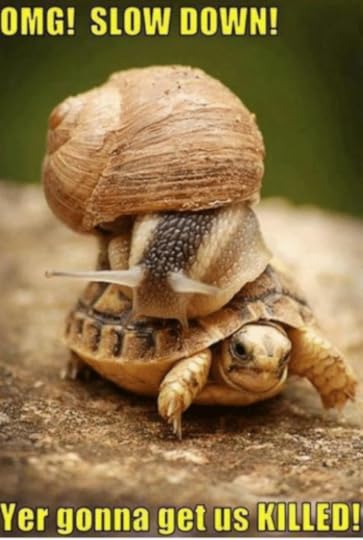 Me driving my mother…
Me driving my mother…Some books are like fine wine, and need time. They require a certain climate, fine weather, nurturing and an aging process. Michael Crichton, Larry McMurtry, Ken Follet, Amy Tan, etc. didn’t churn out books every two months and no one expected them to so.
Granted, some of the greatest works of literature were actually written VERY quickly (as I pointed out in my tongue-in-cheek post ‘Real Writers Don’t Self-Publish). Not all writers have the same pace. Not all stories require the same operational tempo.
Stephen King has written works that took eighteen months and others that took only a few days.
Publishing isn’t One-Size-Fits-All, or at least it shouldn’t be. But we are still enduring the birthing pains.
This said. With this drive for writers to push out content faster than a cartel meth lab, quality has taken a major hit. It’s also deluding a lot of people into believing they can take shortcuts.
That what we writers do is not an art, an artisan craft, a skill that requires YEARS and DECADES of training, learning, practice, classes, reading, and training to refine.
I believe we’ve gone far enough down this digital highway to come to a crossroad where we’ll need to choose.
When I began my journey years ago, the greatest hurdle I had was to get authors to understand we were in the entertainment business and that half of that word was business.
Now that has flipped.
We are still in the entertainment business, entertainment being half of that word. And I am actually excited about that, because I LOVE teaching craft.
*throws glitter*
Granted I love teaching branding and social media but my methods are beyond unorthodox and actually use your creativity.
Others might want to lobotomize your imagination, whereas I want you to let your muse out of the classroom and so she/he can have Field Day every day. Lord, all this algorithm, dashboard, metrics…
Is it me, or does it feel like our poor muses have been trapped in a standardized test since 2012?
*gagging sounds*
Summing Up the Winning Edge
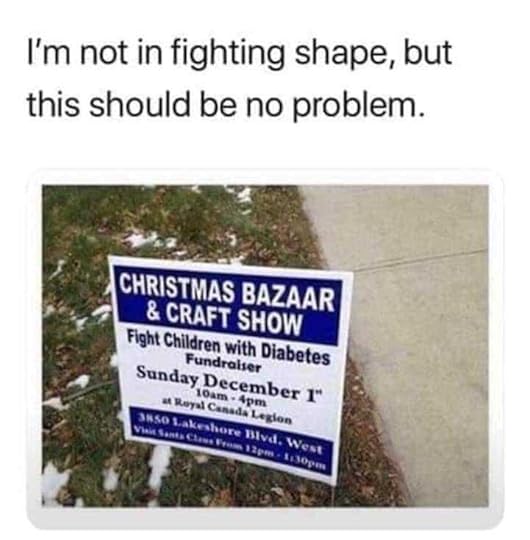 I KNOW! I’m a terrible person for laughing.
I KNOW! I’m a terrible person for laughing.We can look at this bloated, dreadful market and see doom, or opportunity. For those ready to seize advantage, it’s pretty simple.
Own being an author. You’re an artist and an artisan.
Start building your space. Plan for success. For discounted web-hosting with white-glove treatment, go HERE and tell them I sent you for a special author rate. TechSurgeons caters to a lot of authors. The big web hosts won’t necessarily care if your site gets hacked at three in the morning, six hours before before your book launch, but TechSurgeons WILL. If you’re already with a different host, they can move you over easy-peasy.
Get a copy of Rise of the Machines or take the On Demand Branding Class. You can also go through my archives for free to learn all you need to know. What I teach is very simple and VERY effective…oh and FUN.
Read, A LOT. Watch a lot of movies, television, series. Take notes. Study dialogue, characterization, vocabulary, subtext.
Go to that list I provided and treat yourself to some of those resources. Read those blogs and take their classes, too.
Take some Bad Lamb Academy Classes. They’re designed to give you the winning edge. I have a couple of SWEET specials listed below (and ALL our classes come with recordings). It’s going to take more than one or two classes to train y’all into any semblance of mastery, which is why we work hard to make these affordable. Recordings allow you to go back over material.
Once you’ve read the books and blogs and taken the classes, write A LOT. Practice is a whetstone that sharpens the winning edge.
And finish. Then repeat. Be a FINISHER.
What Are Your Thoughts?
I believe the pendulum is swinging back the other way. The glut of everyone wanting to market and advertise their way into best-selling author status just isn’t panning out like it used to.
I feel we are getting back to the basics of ‘Can you tell a GOOD story?’
Does that make you excited? What are some of the areas you find yourself neglecting? Do you struggle claiming that you are a ‘real’ writer and so you put everyone and everything ahead of writing and honing your craft?
I love hearing from you!
And to prove it and show my love, for the month of NOVEMBER, everyone who leaves a comment I will put your name in a hat. If you comment and link back to my blog on your blog, you get your name in the hat twice. What do you win? The unvarnished truth from yours truly.
I will pick a winner once a month and it will be a critique of the first 20 pages of your novel, or your query letter, or your synopsis (5 pages or less). Will announce October’s soon. Finally back to feeling ‘normal-ish’ from the bronchitis.
In the meantime, PLEASE treat yourself to a class!
So the BIG SPECIALS
On Demand: Beyond Bulletproof HOLIDAY Barbie
Usually $55 and now only $30. This is a THREE-HOUR class on guns, knives, weapons, fighting, law enforcement (from local cops to international espionage) and more. Everything you need to build a bad@$$—male OR female—and get the details CORRECT.
On Demand Plot Boss: Writing Books Readers Want to BUY
Sale on this class ENDS Monday.
New Classes
Why Are We HERE? Scenes that HOOK
THIS FRIDAY, NOVEMBER 22nd, 2019. Use New20 for $20 off.
Tick Tock: How to Plot Mystery Suspense Series
Tuesday, November 26th 7:00-9:00 p.m. EST (NYC TIME). Use New20 for $20 off.
NEW ON DEMAND CLASSES
On Demand Dark Arts: Building Your Villain
Use New20 for $20 off. Discount good until November 28th.
On Demand Bite-Sized Fiction: How to Plot the Novella
Popular On Demand Classes
The Art of Character: Writing Characters for a SERIES ON DEMAND
Use Binge10 for $10 off.
How do we create characters that readers will fall in love with, characters strong enough to go the distance? Find out in this THREE-HOUR class that also comes with detailed notes and a character-building template.
This class dovetails with my previous class:
Bring on the Binge: How to Plot and Write a Series (ON DEMAND). Use Binge10 for $10 off.
Need some help with platform and branding?
Branding: WHEN YOUR NAME ALONE Can Sell (ON DEMAND)
Use brand10 for $10 off.
For the complete list, go to the OnDemand Section.
The post The Winning Edge: In a Glutted Market, How Can Authors Stand Apart? appeared first on Kristen Lamb.
November 18, 2019
The Evil Has Landed: Villains Could Be Much Like You…or Even Me

Evil has been one of the most fascinating topics among humans since we created the ability to have heated conversations. Humans would gather to argue over roasted mammoth after the hunt was over.
Was Urg’s son, Perry, simply hard to handle or evil? If he was evil, then why? Had the gods cursed him somehow? Too many blows to the head?
Maybe the parents were to blame.
Granted, Perry’s mother, Yell, was better with a battle club than her husband. Urg preferred chewing mammoth skins and decorating hides.
Yell was awesome at killing stuff and the whole tribe was on a list for Urg to renovate their caves, but all this aside?
Young Perry was simply terrifying.
To be fair, Perry’s insatiable urge to kill small animals kept them all with plenty of snacks. He also loved to set these things called ‘fires’ and those had seriously come in handy, but still.
No one trusted him near the small children and babies, mostly because they tended to go missing.
So the tribe discussed this new idea of ‘evil’ over one of Perry’s disconcertingly convenient fires.
And they probably had trolls back then, too. Just argued to argue. Like the giant turtle in the sky was really a rock. But humans pretty much all carried big sticks so likely campfire trolls behaved better.
At least they did in my head.
For those humans too lazy to carry a big stick (or who forgot to bring one–‘my ancestors’) they just drew cave paintings telling the story of Og the Campfire Troll’s tiny man parts.
They spun a yarn in colorful pictograms about how Og the Campfire Troll really didn’t kill that saber-toothed tiger. The poor beast fell over when it saw Og’s tiny man part then died of embarrassment.
And the satirist was born! Proving the sharpened stick dipped in colorful mud was mightier than the club.
True history I just made up.
They also told stories of gods and monsters and…of evil.
Evil Fascinates Us
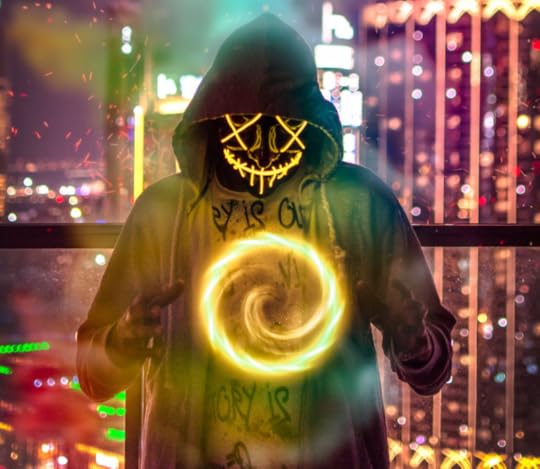
I know there are all sorts of stories out there for all types of readers. This is why there are many kinds of writers. My dear friend Sharon Hughson LOVES sweet romance and Hallmark movies.
I tell her the body count isn’t high enough for me…then she *metaphorically* throws things at me.
Alas, even in sweet books and cozies, there will still be opposition though it won’t be the sort of opposition we’re going to talk about today. These stories have their place—TRUST ME (we’ll get there in a bit).
But evil, REAL evil is not a pet. It is nothing to toy with, though time and again humans do.
It’s in our nature.
Myth, Man & Evil

Evil has fascinated us from the dawn of time, a topic that’s said a lot more about the object than the agent. Humans are wired for story. We’ve been telling stories since we created language and communication.
And what makes these stories interesting is some overwhelming force the hero MUST CONQUER or die trying or all is lost. The best stories generally have a villain, and the badder the villain the better the story as we talked about last time.
Humans have always wrestled with the idea of good and evil, right and wrong, the origin of evil, etc. Virtually every faith on the planet explored and explicated good and evil in great detail long before any of us came along to form an opinion.
Myth and story have also added much to the conversation directly or obliquely. Beowulf, Chaucer, Shakespeare, etc.
Wanna talk about good and evil? Read Greek mythology O_O.
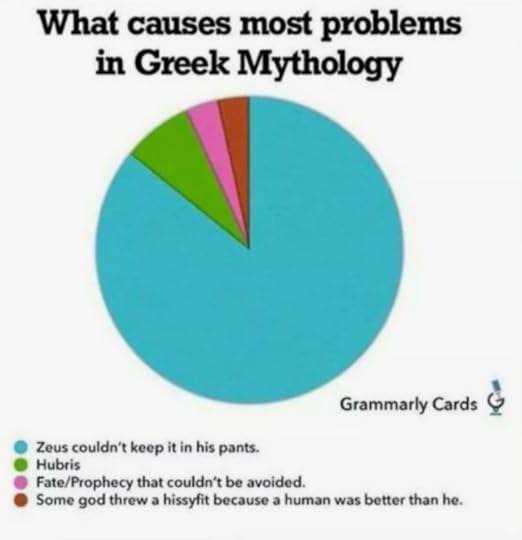
From Dante’s Inferno to Milton’s Paradise Lost to Goethe’s Faust, the audience is privy to glean all varieties of grim and gory images of hell and all its endless torments. What would happen to those evil-doers who failed to follow a certain moral standard.
Oddly, much of this inflammatory literature—*bada bump snare*— has done more to inform people what ‘hell’ would be like than was ever mentioned in the Bible.
Hell was big business in the Middle Ages, mostly because horror movies hadn’t yet been invented.
Evil & The Age of Reason

By the middle of the 19th century, science was getting a toehold and taking over areas previously dominated by religion.
Yet, once we careered into the 20th century, psychiatry was blazing untouched paths with new technology, pharmaceuticals, theories, tests, trials, and the chrome-plated word ‘SCIENCE.’
These days (in regards to ‘evil’) neuroscientists are trying to reverse engineer what is going wrong with the brain using fMRI machines. IS there some sort of a mechanical glitch that makes one person choose cruelty over kindness?
Of course, there is one camp that claims that evil people are ‘born that way’ and cite images of some brain doo-hickey not lining up with a cerebral thingamabob. See, they can’t help it! We need a factory recall on these broken evil brains.
Ah, but then they’re countered with the opposition who cite the wonderful marvelous plasticity of the human brain. That we can’t simply look at one shot in time and make any judgement because brains are very malleable, etc. etc.
SEE how fascinating evil is and we aren’t even in a STORY?
This is why friggin’ thousands of years later, we humans have a HADRON COLLIDER that could possibly create a miniature BLACK HOLE.
MEANWHILE, we probably also have some @$$hat who’s fantasizing about tossing kittens into that black hole and ZERO answers as to WHY he’d DO THAT.
Sigh. We deserve the meteor strike.
Evil: Fun & Games Aside
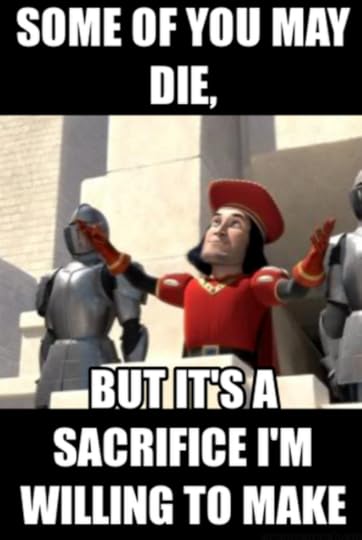
Evil is always an interesting topic because there are never clean and tidy answers. I believe this is what makes for the best stories and the best villains.
I’ve been really sick lately. REALLY sick. I’ve had to postpone my Villains class twice because of bronchitis, but I think it worked out for the best because I’ve revamped the entire thing after reading Ken Follet’s Pillars of the Earth.
***It’s gonna be EPIC, or so the cold medicine voices tell me. Sign up here for Dark Arts: Building Your Villain, and use New20 for $20 off.
Anyway…
Part of me wanted to write Follet hate mail. I hated the book as much as I loved it…for the first sixteen or so hours. Then the ratios shifted more to the loving it side.
Alas, loaded to the gills with medicine, I’m sure my nerves were already shot, but I kept having to stop the recording.
***I listen to mostly audio books, so throwing books across the room means a cracked phone.
There were a number of times I almost quit. My nerves were shredded. I was a wreck. The villains? I didn’t dislike them. Didn’t hate them. I loathed them. Defeat wasn’t good enough, and I strongly doubted ruination was good enough either. Nothing would make me feel better.
N-O-T-H-I-N-G.
There was literally NOTHING that could be done to these characters that would have satisfied my bloodlust.
And, when I calmed down, I thought, ‘What a strange reaction.’ I honestly cannot remember a book that distressed me that much other than maybe Stephen King’s ‘It‘ (the people of Derry, Maine, NOT the clown).
Then, I did what I always do and I pulled the story apart. Reverse engineered the experience and saw the error of my ways.
Now, in fairness, I teach a lot on antagonists and what I call the BBT (Big Boss Troublemaker)—the person/entity responsible for the core story problem.
One of the reasons I read so prolifically is I am always wanting to learn, to uncover any blindspots…and Pillars of the Earth sucker punched me.
It Isn’t for Everyone
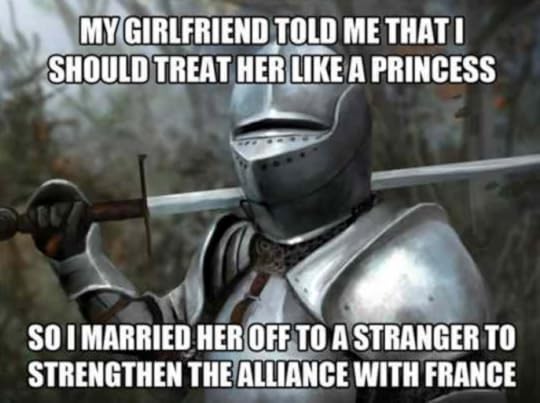
Like any book, Pillars of the Earth isn’t for everyone. It nearly wasn’t for me. Every time I considered turning it in, I kept going until I couldn’t stop because I HAD to know if there was any kind of justice in this mad, mad world.
And there you have it.
We are ALL wired with a sense of right and wrong. Even a sociopath has a sense of justice.
Read Martha Stout’s The Sociopath Next Door. A sociopath might not lose any sleep emptying your bank account, but would be horrified if you did the same to him.
Follet masterfully wove situations where I was rendered utterly and hopelessly powerless.
What is the epitome of being a victim? ZERO POWER. When evil strikes, what does it do to a person?
It strips away their power.
From money crimes to sex crimes, to hate crimes to murder it’s the same. Arson, abduction, terrorism, shootings, burglaries, large-scale vandalism, gossip, slander, lies, it hits us all in the same place.
It makes us afraid and vulnerable and impotent.
What makes it worse? When we KNOW who’s done this, but this is a person no one can touch.
This was what made me practically foam at the mouth reading Pillars of the Earth. Because the story is (loosely) based on actual history. In the Middle Ages, nobility and high-ranking clergy got away with a LOT of really, really bad things.
Talk about powerlessness to the power of a thousand.
*Kristen punching things* *grabbing for inhaler* *ponders subscribing to Hallmark channel*
Yet, it kept me listening (turning pages) because I could not rest until the world was set right and justice was served. I wasn’t even sure it would be or could be. And if it was, HOW?
THAT, my friends, is some fine storytelling (so I am extremely glad I didn’t return the book).
Evil & The Lenses of Power
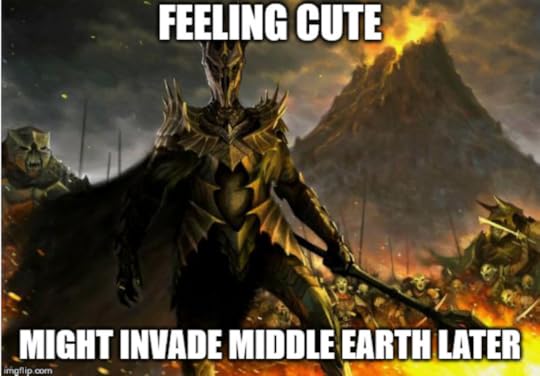
After finishing Pillars of the Earth I thought about other iconic villains. Last time, I mentioned how often villains are the hero of their own story, that we can (Hint: we CAN, but don’t HAVE to) give them an empathetic POV.
This said, Sauron has NOTHING empathetic about him. He craves power for the sake of power no matter the cost or the casualties.
Considering Tolkien drew off his experiences from WWI (not WWII), it’s reasonable to deduce that Sauron is a proxy for the Central Powers. A force rising and gathering strength, bent on destroying all that resists for one goal—complete domination.
Voldemort was another villain who made the heroes shine brighter because he was darker than dark. Maybe he had some motivation somewhere, but the more he destroyed, the more we grieved.
The more he killed, the more people we mourned and the stronger our thirst for vengeance justice.
There was a toxic imbalance in the universe that HAD to be set RIGHT.
Much of what goes into forming villains that gets underneath the audience’s skin is to understand—really understand our story—make sure it is strong enough and then search out those pain points that will likely exist in our readers.
The pain points won’t be the same for all stories.
Evil & To the Pain
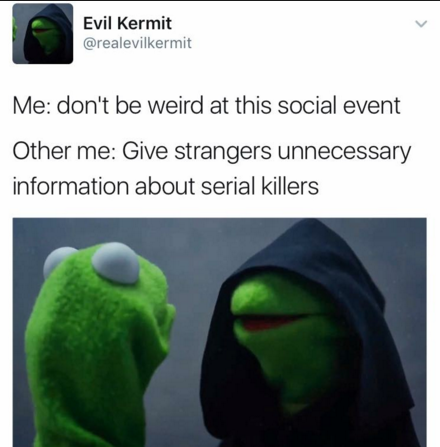
For instance, Follet, used history and the rules of the church and the laws and customs of the time to vex the ever loving bejeezus out of me *great gnashing of teeth.*
One of the reasons I got so ridiculously upset was because I’m a history buff, and knew what these folks could get away with. I also knew they were exploiting the chaos of the civil war to break laws that, in a time of peace, would have had them hanged.
This said, understanding these realities from an academic point of view is one thing. Watching these horrors play out in story, through the eyes of characters is vastly different.
Especially when in the heads of the villains.
*washes brain with bleach*
To use a very different example, but one that had a similar effect.
How many of you read or saw the movie ‘The Help‘? When Hilly Holbrook built the bathroom specifically for ‘the help,’ I saw red.
But when Hilly fired Minny for refusing to go outside to use ‘the help’s’ bathroom during a dangerous storm and for using the guest bathroom instead?
Then she unnecessarily slandered Minny’s name insinuating she was a thief, thus making Minny essentially unemployable?
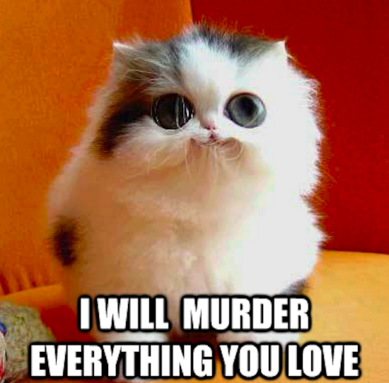 Me.
Me.What made this whole tableau so infuriating was technically Hilly (villain) hadn’t done anything wrong. In fact she had plenty of high society ladies there by her side telling she was the victim, poor dear.
*growls*
Of course the wrong Minny suffers is only one of many, inflicted by a toxic, deluded, and diseased culture. We hate it and every time the women we’ve grown to love suffer, we suffer.
And then—FINALLY—there is victory. We can celebrate!
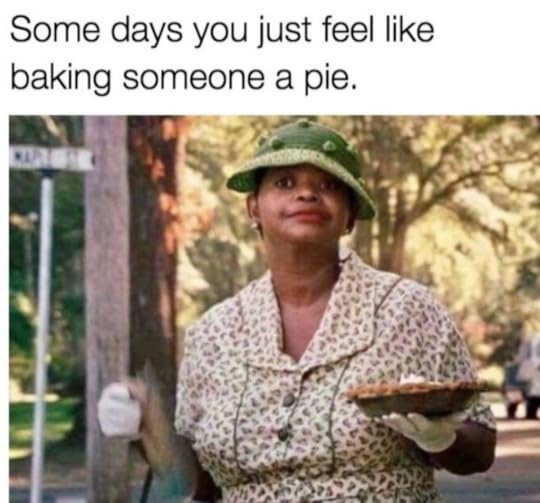
Depending on genre will depend on what pain point you’ll want to exploit, how hard you’ll want to push, and how to reasonably give your reader the satisfying ending they crave (that doesn’t feel too cookie-cutter).
How can we make our reader feel helpless? What ways can our villain strip away their sense of power? Can we make it seem our ‘good guys’ will never get their power back? Is there a way our villain can hide behind the authorities?
There are a lot of ways we can upset the main character’s world, but largely it is going to be with yanking the rug from under his/her feet.
If we can get a resounding cry of, ‘That isn’t FAIR!’ from our readers?
All the better.
Fiction & the Fight Against Evil
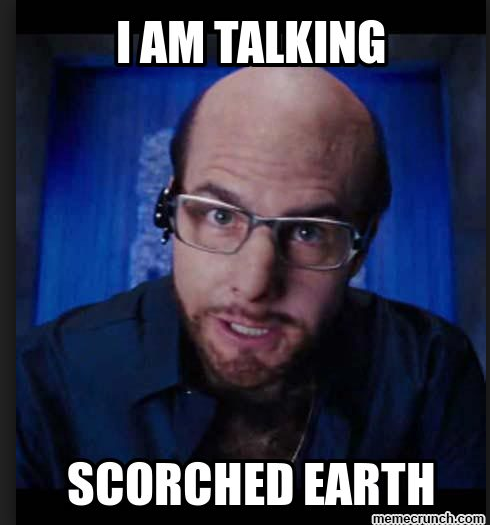
All too often, fiction gets dismissed as foolishness. Fantasy. It’s a waste of time. Is it? Or do stories serve as humanity’s conscience? They have for more than several thousand years. Don’t see why that would suddenly change.
Samsung just released a giant flatscreen television they’re literally calling The Wall. I’m guessing no one in marketing has read Fahrenheit 451.
***Unless the marketing staff are mostly Gen Xers, then they’re probably being smart@$$es.
Bladerunner, Do Androids Dream of Electric Sheep, 1984, Brave New World, Animal Farm, the list goes on. Frivolous brain candy or cautionary tales?
I believe fiction is the safe place, the mental holodeck where we can experience catharsis. Fiction allows us to explore a whole pallet of human emotions, some of them nice like love, comfort and nostalgia. Perhaps a story of simpler times and family *nods to Sharon*.
Other stories? We get to deal with, explore, understand outrage, anger, grief, injustice, the less ‘socially acceptable’ feelings in our modern world.
Villains allow us to have that face-off with evil and test our mental and psychic mettle. We can at least—in theory—answer the question, ‘What are we made of?’
Because the truth is, we don’t know.
I’m certainly hoping I never know.
All arguments of evil, villains, nature, nurture, and brain glitches aside, we don’t know what any of us are capable of with the right set of circumstances.
And if we’re smart, that should scare us.
In the End
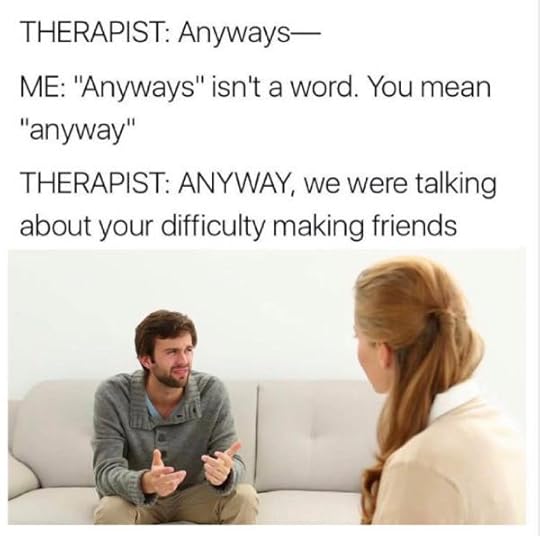
The debate about evil will rage on, but that means people will keep craving new stories. Yes, we humans have our skyscrapers, espresso machines, yoga dress pants and our Hadron Collider.
We might even one day get our tiny black hole. Yet, we still have our psychopath out there with a box of kittens. Evil still exists.
But we’ll get balance.
When our psycho tosses those balls of adorable fluff into that eensy black hole, the joke will be on him. Because if any creature could discover a multiverse it would be a kitten.
They’ll return in force—with an army of sentient socks and Tupperware lids to negotiate peace with Earth.
They’ll leave us unharmed, if we will just let them have all the catnip, tuna, and Dan…wearing a Princess Leia metal bikini with a zap collar.
What are your thoughts?
Can you think of villains from story that had nothing redeemable and the reason you turned pages was to see their demise? Or movies or series? What are some examples you can think of when it comes to stories that undid you and really made you think/made you emotional?
I love hearing from you! And maybe some suggestions for my reading list 
November 6, 2019
The Villain: Crafting Scoundrels, Sinners & Substance of Legends
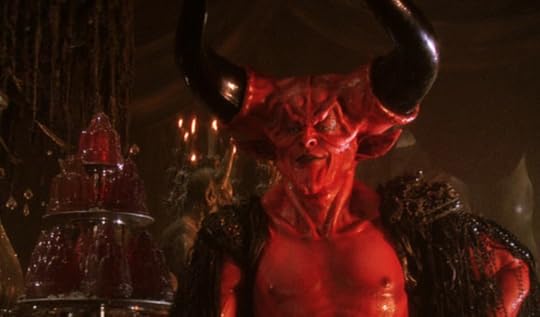
All stories require a core antagonist (the force/character that is responsible for generating the story problem in need of resolution). This said, there are many different types of antagonists. While all villains are antagonists, not all antagonists are villains.
The villain might only be one of many types of antagonists, but they have a power of transcendence that few other archetypes can match.
But since we went there. What goes into creating a worthy villain? How can we create a character that evolves beyond paper caricature and passes into timeless myth?
Moriarty, Darth Vader, Loki, Buffalo Bill, Voldemort, Dracula, Jack the Ripper represent the deepest dark necessary so our heroes can shine the brightest white.
When we think of our favorite stories, how often do we remember the villains, first? There’s something so alluring about the darkness.
This said, it’s the artist who learns how to mold the darkness into something timeless, a character retold every generation in new forms.
Breaking Bad: What Makes a Villain?
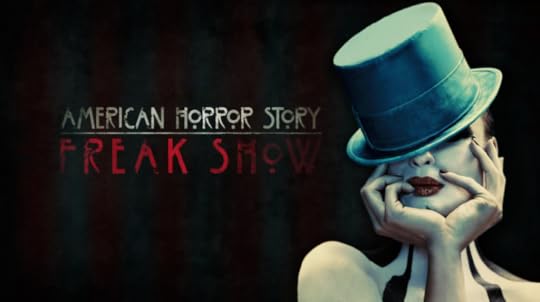
I watch a ton of movies and television series. I also read roughly 1-3 novels a week. I’m always studying, breaking stories apart so that I can understand them better. I do it for my fiction, but also so I can share what I learn with you guys.
Though the series isn’t for everyone (it’s pretty gory), I particularly love FX’s American Horror Story (Seasons 1-4) for studying villains.
***Everything was pretty ‘meh’ after Jessica Lang left the cast, but that’s just my personal POV.
Anyway, AHS is one of those shows that you have to get a few episodes into before you connect, namely because it is often cast with truly despicable characters.
It isn’t until you get a few episodes in that the writers start peeling back the layers and exposing the delicate undersides of the villains…and that’s when you really begin to care for them.
I know. On the surface, this seems bizarre, but it’s true. The early seasons of AHS are some of the best writing out there.
Jessica Lang almost always played the core antagonist in each season of AHS. Of all the seasons, though, Season Four Freak Show was my absolute favorite. It’s by far one of the most superlative stories on the small screen, masterful characters…which is why I’m referring to it today.
Btw, there is a bit of spoiler alert, but it’s necessary. So what do we do to really make the villain POP?
Give the Villain a Sympathetic Goal
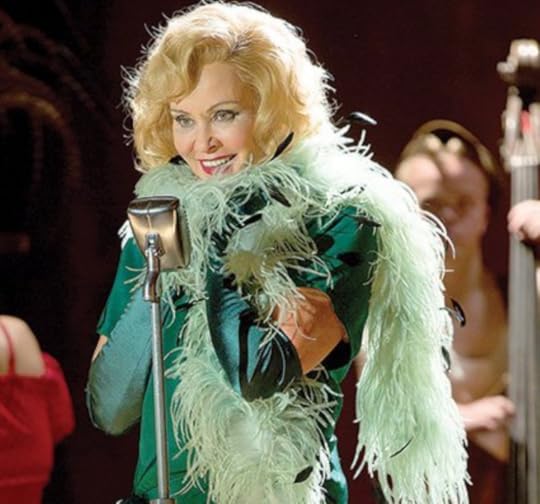 She only wants to be a star…
She only wants to be a star…In Season Four of AHS, Lang plays Elsa Mars. Mars is a self-centered, lying, conniving, murderous woman. But she is a deeply flawed and tragic character. Her goal is two-fold.
First, she wants to become a star in Hollywood. Secondly, she wants to build the best Freak Show in the world.
As a young woman, Elsa is victimized by a man who promises her the starring role in a movie. What he fails to tell Elsa is she has the starring role in a snuff film.
He films another man taking a buzz saw to both of Elsa’s legs then leaves her for dead. Through the sympathy and miraculous skill of an artist-sculptor, she’s saved and given life-like prosthetics and appears ‘normal.’
But this tragedy creates a horrible insecurity. She starts her freak show because deep down, she knows she’s a freak, too.
This makes her feel almost a maternal duty to collect the disfigured. To gather the tragic souls the world casts away and give them a home.
Villains are Heroes of His/Her Own Story
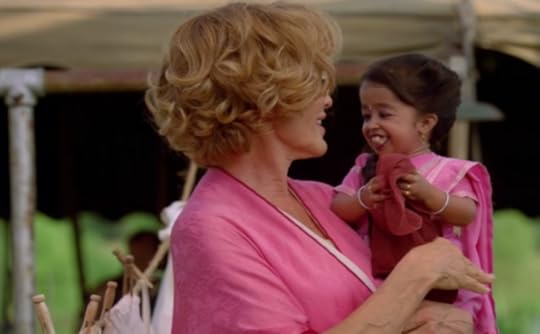 Elsa and Ma Petite
Elsa and Ma PetiteElsa is a mother figure. Under the circus tent, her ‘children’ are stars and they are a family. She knows what life outside the show is like for a freak (she’s lived it). She also appreciates that she is a very different kind of freak.
She has the ability to blend into society. Her children do not.
Make the Villain Conflicted
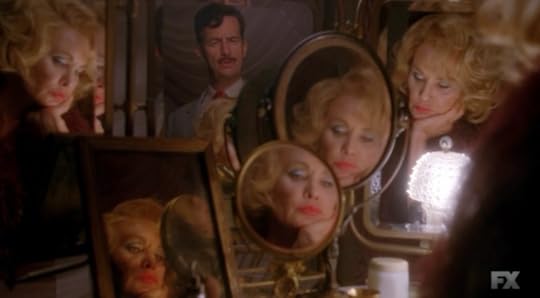 Everything is oh so complicated…
Everything is oh so complicated…Mars is a very troubled and conflicted character. Her goal to take care of her charges and her desire to become famous in Hollywood are always in conflict. Also what makes Elsa so good is also what makes her so bad.
She is relentlessly ambitious (good), but she is relentlessly ambitious (bad).
Remember that our best self and our worst self are often opposing edges of the same blade. This is true for protagonists (heroes) as well.
I see this even in myself. I have a compulsive personality. This is good (2000+ blogs), but can be very, very bad. I latch onto something like a pit bull and don’t let go…but sometimes I’ve latched onto something I should let go of (every ex-boyfriend ever).
As I like to say…
There is a fine line between persistent and stupid.
The reason this duality makes for a layered villain is that great fiction acts as a mirror and reflects a degree of reality back to the reader. When the reader sees the duality of the villain, she is also seeing the duality in herself.
That is the part that can be deeply disturbing.
Maybe we believe we are incapable of murder, but are we really? Or have we simply been blessed with the right life circumstances that have permitted us to never have to really get an answer to that question?
Give the Villain Noble Goals
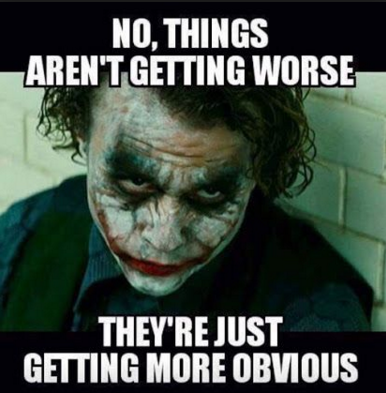
To dovetail off the last point I made, Elsa does some truly detestable things…but we do see there is a not-so-evil motivation behind her actions. Thus, we sympathize and I think that is one of the ways a good villain can truly get to us.
We see the ugliness in ourselves, the great evil we might be capable of in the right situation.
Elsa is profoundly insecure. She created the freak show largely to ameliorate the pain from her deep psychic wounds. If she owns and runs the show, she can be the main attraction. But again, Elsa’s goals collide with the intensity of a tectonic plate shift.
She knows the show has to make money because she clothes and feeds and shelters her ‘monsters.’ But, to be blunt? She’s also greedy. So when another act overshadows her own? Her greed and her insecurity collide.
Make the Villain’s End Tragic
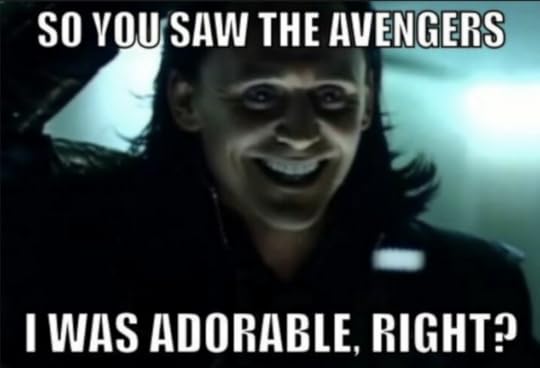
For me, the best villains are the ones we almost are silently rooting for and are really bothered by that. Elsa is one of those characters that in one episode you hate her and in the next you’re rooting for her and the end of the season is beautiful and tragic.
My friend NYTBSA James Rollins says he knows he’s done his job when the reader cries for the villain at the end.
This is also why NYTBSA Allison Brennan and I have had a long-running argument that Hannibal Lecter is actually not a villain but an antihero.
Allison thinks he’s a villain, but I posit that Hannibal is written SO well, he actually blurs those boundaries and becomes somewhat of an antihero.
Y’all KNOW you cheered at the end of Silence of the Lambs when he said he was ‘having an old friend for dinner.’
And what is SO EPIC about this is that the guy he is going to eat is a law abiding citizen who technically has done nothing illegal…but we still are rooting for Hannibal (a serial killer).
And that freaks us out more than a little bit.
Another great villain? The Goblin King from Labyrinth. Every woman over the age of thirty is still wondering why the hell Sarah didn’t take the deal.
Now for THIS Little Slice…
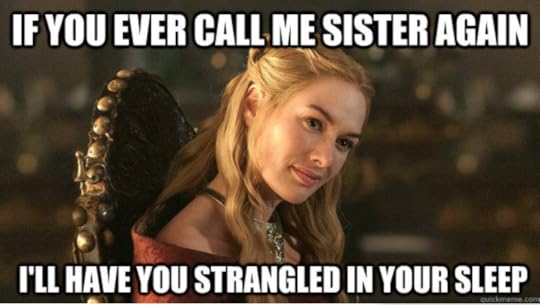
There is another kind of villain, a villain who deeply upsets us and who’s end is a joyous event. We cheer.
Audiences don’t want this type of villain defeated. Fans don’t want them dead. We want them OBLITERATED.
Salt the very Earth with their souls.
I loved Cercei Lannister from Game of Thrones, but largely because she was so complex. We loved her, hated her, but mostly loved to hate her. Which was why she deserved so much better in the end.
But, we’ve already talked about Game of Thrones...a lot.
Michael Connelly’s The Lincoln Lawyer has the best example of this type of villain. The movie is great but the novel? O…M…G. The villain is positively terrifying.
Why?
Namely because this villain exemplifies what we fear most (and what protagonist Mickey Haller also fears).
That we won’t recognize pure evil when we see it.
At first glance, Roulet is the guy every girl would love to land. He’s smart, rich, handsome and charming. But he is also a stone cold killer who exacts suffering for his own pleasure.
What makes this character so disturbing is, like Haller, we believe Louis Roulet is innocent and that he’s been the victim of a terrible scam.
So when we hit that pivot point where we realize we’ve been duped? It rattles us to the core.
Venus Flytrap Villains
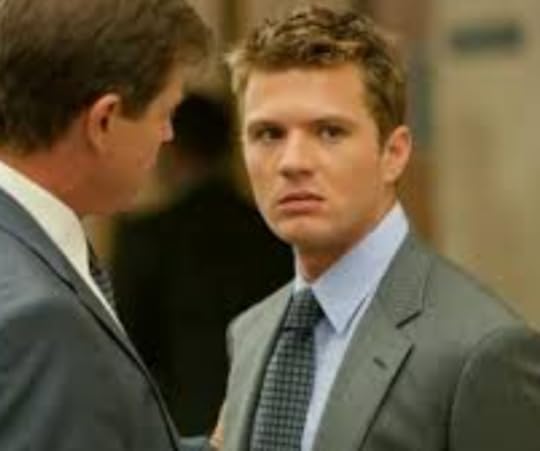 A face you just want to punch…
A face you just want to punch…This type of villain will exhibit the same traits mentioned above, but they are all a deception. This villain is a Venus flytrap. The villain looks like a good guy, but is actually disguised death.
In The Lincoln Lawyer, Roulet has a sympathetic goal. He is an innocent man. The prostitute has snared him in an elaborate frame job so she can sue him for damages in civil court and use him as her ticket out of turning tricks.
Roulet is conflicted. He fails to share various pieces of vital information with his lawyer because he is ‘protecting his mother.’
He doesn’t want to upset her and he cares deeply about her perception of him (E.g. he fails to mention he was going to Reggie Campo’s place to pay for sex).
Roulet has noble goals. For instance, Roulet claims he discovered his mother (also a real estate agent) raped and brutalized in a home she was showing. This is why he carries a knife. Trauma. Protective instincts.
He tells Haller that real estate agents often meet clients in homes alone and there is no real way to vet that they aren’t psychos (um irony), so he carries for protection.
Notice how Connelly hits on ALL the notes of a villain, but camouflages them as a hero.
THIS is why our world turns upside down when we realize it is all a lie. Roulet does not have a sympathetic goal at all!
He’s a sado-mysogynistic killer and his only goal is to exact suffering…then destroy another man’s life by framing him for his crime.
This villain is not conflicted at all. He is very well aware of what he’s doing. He’s narcissistic and believes he is above the rules that govern society.
He does not have noble goals. His goals are as black as they come. This is why, unlike a villain like Elsa Mars, when Roulet meets his end? We cheer.
In fact, regarding this, I actually prefer the ending in the movie where Haller’s motorcycle gang clients beat Roulet within an inch of his life before he’s hauled to jail.
A good way to make this kind of villain work is to create a deflection. Cast an innocent character as the ‘villain.’ It is essentially a ‘bait-and-switch.’
In the case of Roulet, the prostitute he brutalized carried the mantle of villain until Act Two.
Practice Makes Perfect
Overall, much of what goes into crafting legendary villains (or any character for that matter) has to do with study and practice. Watch television or movies actively. Take notes. Pay attention. Read a LOT of books.
Why did a villain resonate? Why not? Can you do something similar but different? Perhaps better?
Also PRACTICE. A fantastic way to hone our character-building skills is to use them…as much as possible. We have a brand new class that’s actually PERFECT for this. Maria Grace will be teaching how to write novellas this Friday (use Bite10 for $10 off).
While the full-length novel is what most of us are striving to complete, the novella is wonderful for cultivating an audience and for building skills. How we get good at writing villains is by writing a LOT of them.
The novella is a fantastic place to hone those skills (and also a lot of modern readers have the attention span of a crack-addicted fruit fly).
If we look at the authors most renowned for crafting villains—Stephen King, Neil Gaiman, Ray Bradbury, Philip K. Dick—they wrote a LOT of short form works. Not only are many of these shorter works now considered ‘literature,’ but filmmakers later adapted many of these works into film. So I STRONGLY recommend her class.
***Remember a FREE recording is included in purchase price.
Also for additional help beyond this blog, I’ll be teaching Dark Arts: Building Your Villain next Tuesday (use Thrill10 for $10 off).
What are your thoughts?
Does this help you understand how to give depth to your villains? What are some of your favorite villains from the page or even the screen?
I love hearing from you!
And to prove it and show my love, for the month of NOVEMBER, everyone who leaves a comment I will put your name in a hat. If you comment and link back to my blog on your blog, you get your name in the hat twice. What do you win? The unvarnished truth from yours truly.
I will pick a winner once a month and it will be a critique of the first 20 pages of your novel, or your query letter, or your synopsis (5 pages or less).
In the meantime, PLEASE treat yourself to a class!
Upcoming LIVE CLASSES Through November
Yes, I know most of us will be doing NaNoWriMo, which is why a FREE recording is included with your purchase.
Bite-Sized Fiction: How to Plot a Novella
FRIDAY, NOVEMBER 8th 7:00-9:00 p.m. EST (NYC TIME). Use Bite10 for $10 off.
Dark Arts: Building Your Villain
November 12th, 2019 7:00 P.M. tp 9:00 P.M. EST (NYC TIME). Use Thrill10 for $10 off.
Tick Tock: How to Plot Mystery Suspense
THURSDAY, November 21st 7:00-9:00 p.m. EST (NYC TIME). Use Thrill10 for $10 off.
Why Are We HERE? Scenes that HOOK
FRIDAY, NOVEMBER 22nd, 2019. Use Thrill10 for $10 off.
ON DEMAND CLASSES
The Art of Character: Writing Characters for a SERIES ON DEMAND
Use Binge10 for $10 off.
How do we create characters that readers will fall in love with, characters strong enough to go the distance? Find out in this THREE-HOUR class that also comes with detailed notes and a character-building template. Again, use Binge10 for $10 off.
This class dovetails with my previous class:
Bring on the Binge: How to Plot and Write a Series (ON DEMAND). Use Binge10 for $10 off.
Need some help with platform and branding?
Branding: WHEN YOUR NAME ALONE Can Sell (ON DEMAND)
Use brand10 for $10 off.
For the complete list, go to the OnDemand Section.
The post The Villain: Crafting Scoundrels, Sinners & Substance of Legends appeared first on Kristen Lamb.



